the VOLUNTEER
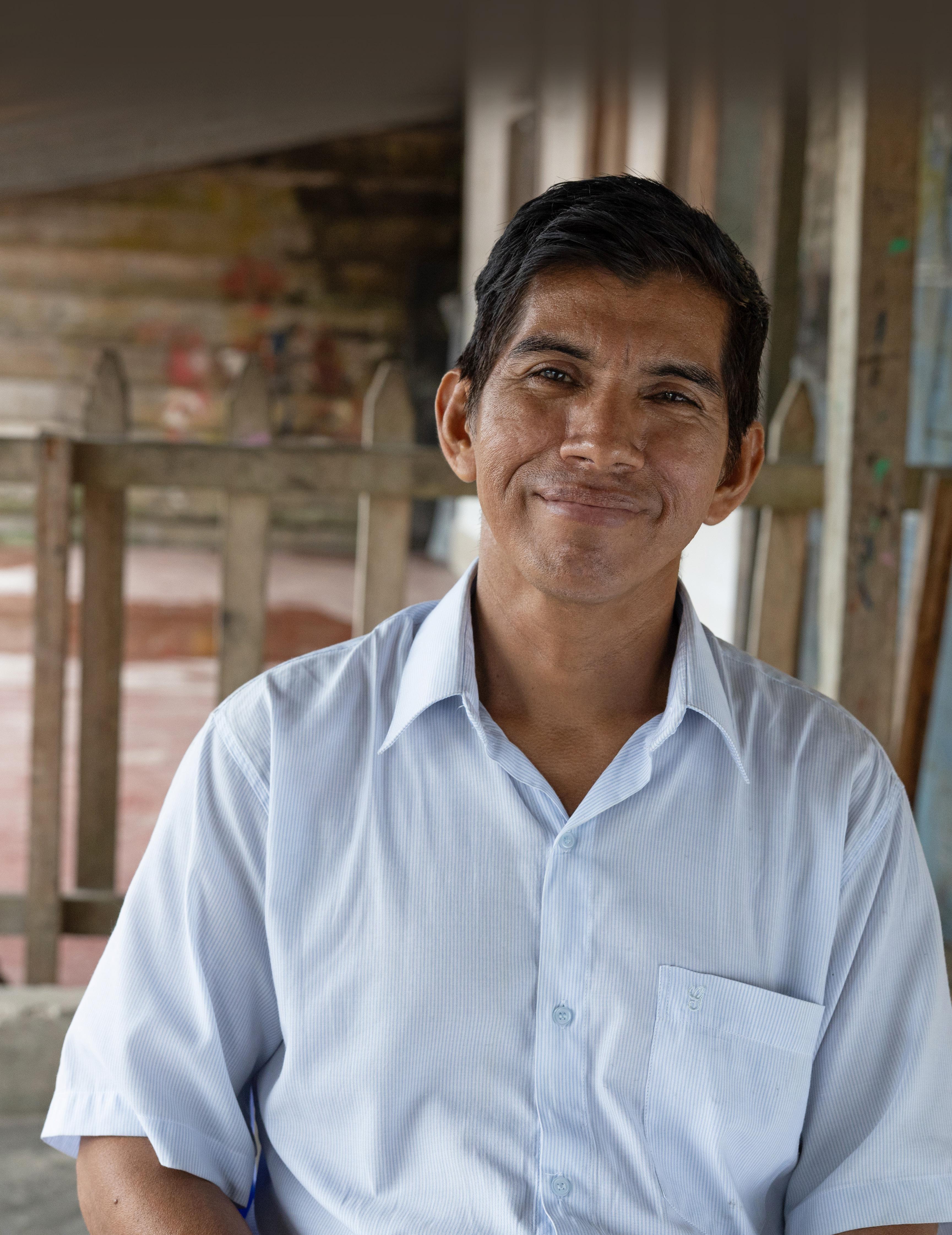
A DIFFERENT KIND OF ISLAND
How Maranatha is bringing hope to those who feel forgotten
A Publication of Maranatha Volunteers International ISSUE 1, 2024
MULA BINIDI, INDIA
As is customary in India, shoes are removed before entering a place of worship, leaving a collection of footwear at the entrance of this church. While the Mula Binidi Seventh-day Adventist Church, in Andhra Pradesh, looks nothing like a holy place, for this congregation, it’s the only temple they’ve got.
The space is made from sticks, pieces of chain link fencing, and black tarp. Inside there are mats laid out on the dirt floor, where people can sit. While the structure provides a certain level of shelter, it is ineffective. It can get unbearably hot during the day, so the congregation prefers to meet in the evening, when temperatures
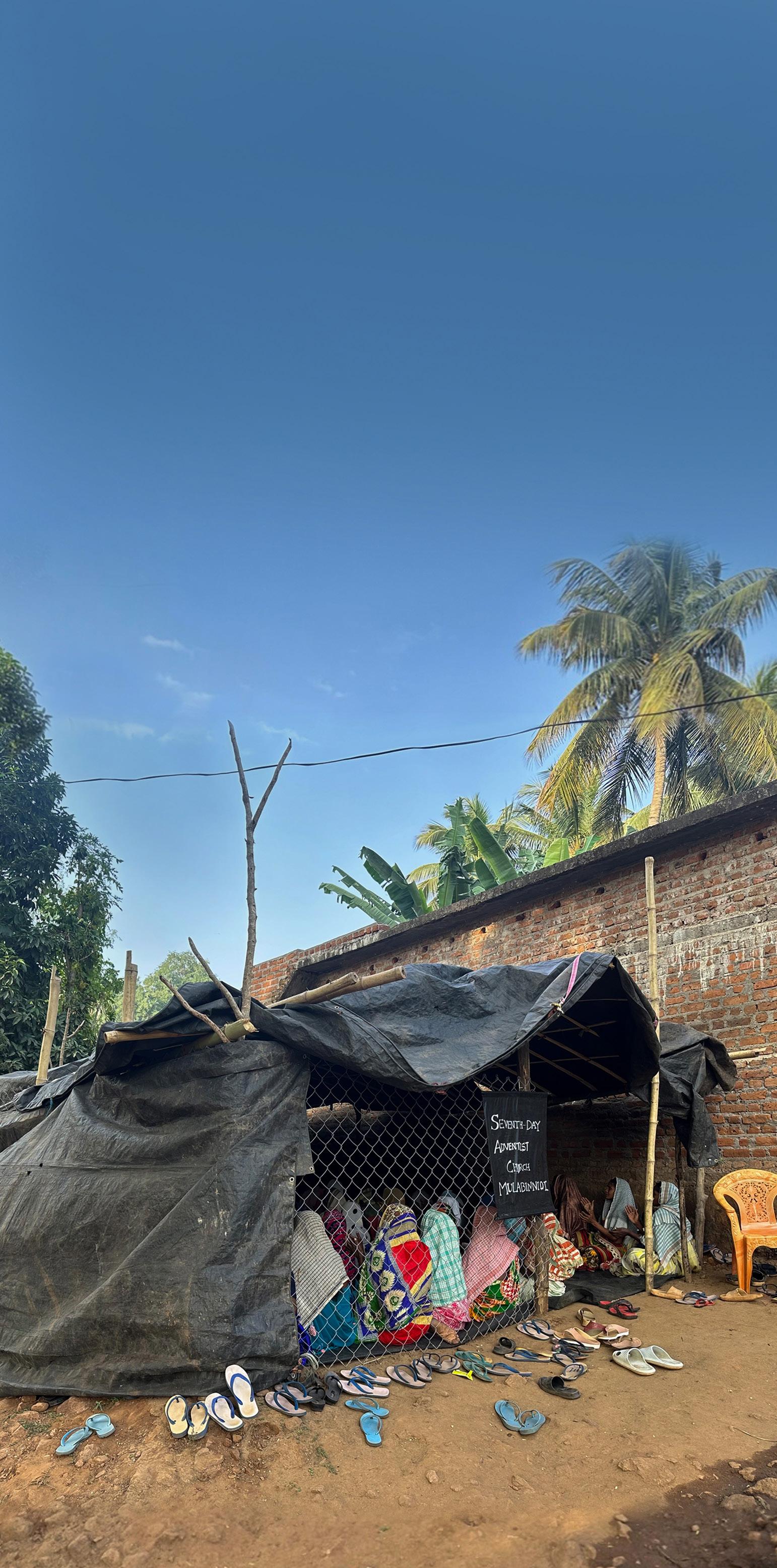
VOLUNTEER the
cool off a bit. Plus, the materials are flimsy and no match for the region’s heat, rain, and wind. Mula Binidi’s tarp is torn in multiple places and is unlikely to last another season.
The members of this mostly Hindu community don’t have the means to build a permanent, respectable structure. They, like many of their neighbors, live in poverty. But while they may be poor in material wealth, they have found great wealth in the hope of Jesus Christ.
This same hope is what will bring a permanent Maranatha church building to Mula Binidi, later this year, thanks to supporters like you.
Julie Z. Lee Editor
Heather Bergren Managing Editor/Designer
Dustin Comm Writer
Sidney Needles Writer
UNITED STATES HEADQUARTERS:
Maranatha Volunteers International
990 Reserve Drive
Suite 100
Roseville, CA 95678
Phone: (916) 774 7700
Website: www.maranatha.org
Email: info@maranatha.org
IN CANADA:
Maranatha Volunteers International Association
c/o V06494C
PO Box 6494, Station Terminal
Vancouver, BC V6B 6R3
CANADA
All notices of change of address should be sent to the Maranatha Volunteers
International United States address.
Maranatha spreads the gospel throughout the world as it builds people through the construction of urgently needed buildings.
About the Cover:
Josue Salazar Huayta lives in the jungle city of Iquitos, Peru, and helped to establish the Adventist church in his neighborhood. After over a decade of meeting in offices, homes, and a deteriorating building, Josue joyfully awaits the solid worship structure Maranatha will build for his church family in 2024.
Photo by Julie Z. Lee
Photo by Christina Lloyd
THE MARANATHA CIRCLE
By Sidney Needles
Everyone is born into a circle, although each one differs greatly in appearance and function. My circle’s earliest form was simple–natural. I was only subconsciously aware of its presence during my first formative years of life. But there it was regardless, offering 365 degrees of stability, support, and vitality. That familial unit of only four members was my entire world.
Over the years my circle evolved along with me, undergoing exciting growth and inevitable loss. It wasn’t until I attended Union College in Lincoln, Nebraska, that it reached its largest and most well-rounded form. It supported me through some pretty tough years and simultaneously transformed them into some of the best. I loved that version of my circle and the person I grew into while living at its center.
But my college circle had a built-in expiration date: May 7, 2023, to be exact. Throughout a robed walk across a graduation stage, a barrage of photos, and endless congratulations, its loss was a persistent ache in my chest. The community I shared so much life with, matured within, leaned on, and supported was losing a crucial degree of accessibility.
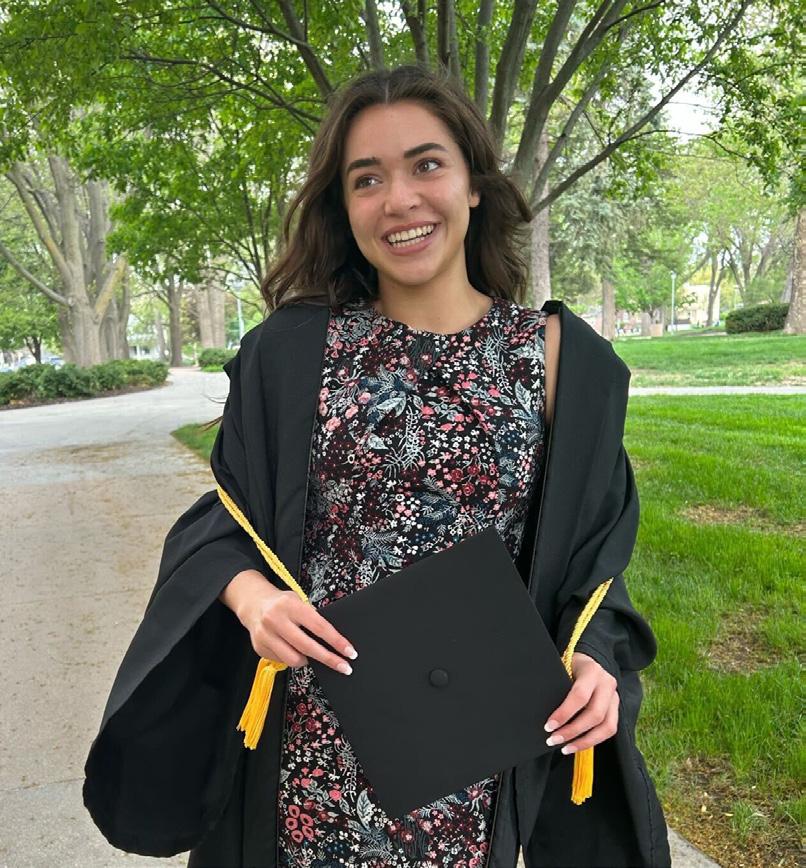
Three months and 1,510 miles later, I was surrounded by unfamiliar faces in a conference room at Maranatha’s headquarters in Roseville, California. I’ll admit I remember little of the presentations from my first staff meeting. But I will never forget the warm energy, laughter, and passion that began to soothe the ache of my college circle’s loss for the first time in months.
I’m a communications specialist on Maranatha’s marketing team, and the bulk of my responsibilities involve writing. One of the best parts of my job is watching the constant stream of colorful stories flow across my desk, snatching up the select few I get to share with readers around the world. My gray rolling desk chair is the front row seat to a classic film about Maranatha’s story, which I’ve only just begun and am already inclined to cherish.
I’ve watched this “film” for several months and found the Maranatha circle to be vast and beautifully diverse, yet somehow intimately connected. Its members hail from Iceland’s coastal plains, Australia’s scorching Outback, and seemingly everywhere in between. But the impressive reach of its
circumferential arms doesn’t diminish this circle’s universal sense of warm togetherness.
This truth isn’t revealed by impressive reports of structures built, wells drilled, or even Seventh-day Adventist Church growth. It emanates from the handshake of volunteers meeting on the jobsite. It rings through the cheery greeting of a receptionist on the other end of the line. It streams down the cheeks of a church member describing her congregation’s decades of struggle for the first time.
I moved across the nation, determined to endure my circle’s loss, while rebuilding a new one from scratch. But I, like countless others, have been welcomed into Maranatha’s with open arms. That’s what the Maranatha circle is for so many. It’s a place for love to flourish amid devastating lows, euphoric highs, and all the beautiful little moments tucked between.
www.maranatha.org THE VOLUNTEER ISSUE 1, 2024 | 3
Sidney Needles is the communications specialist at Maranatha
SHARING THE Mission
AROUND THE World
A snapshot of volunteers and projects in the mission field.
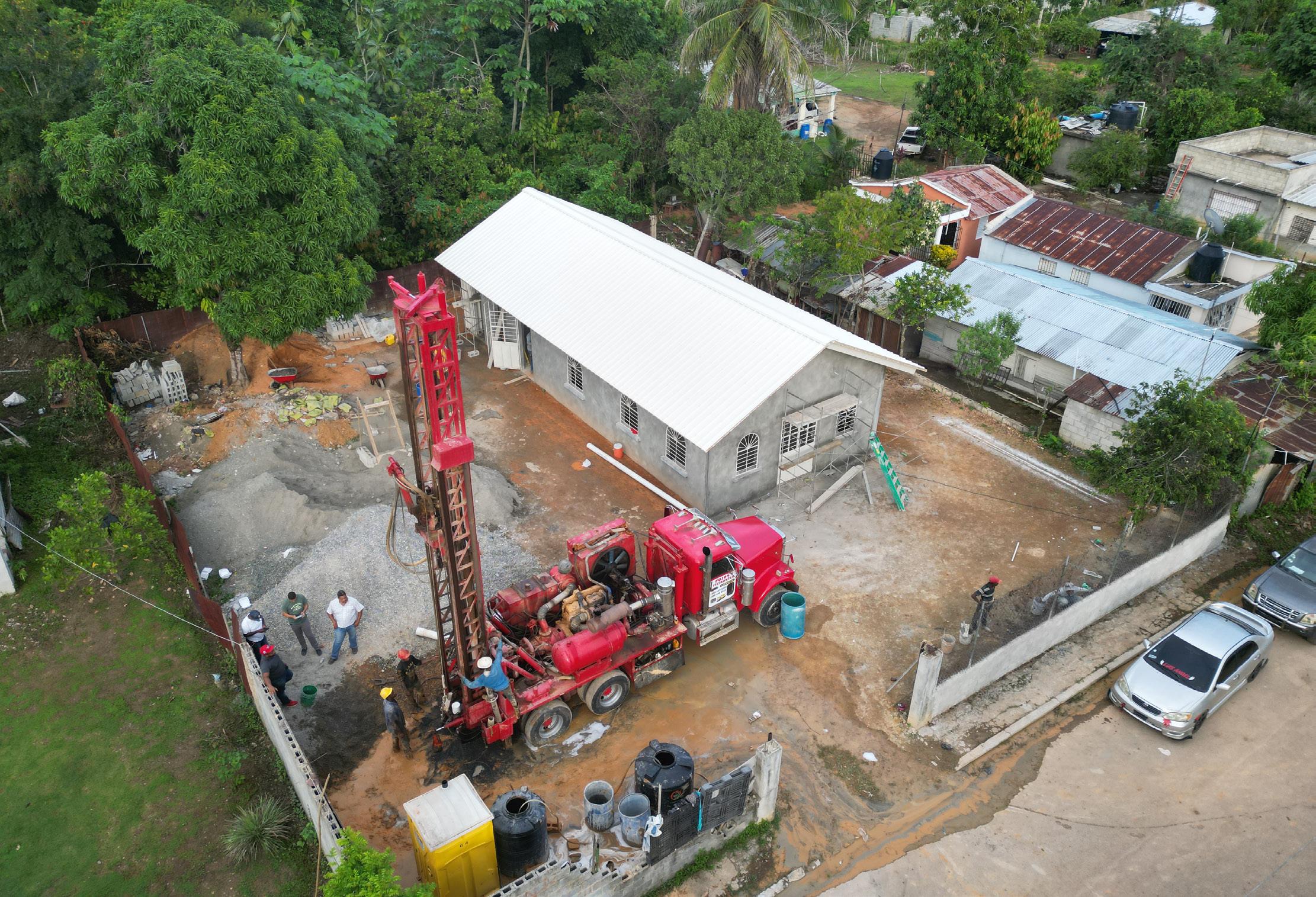
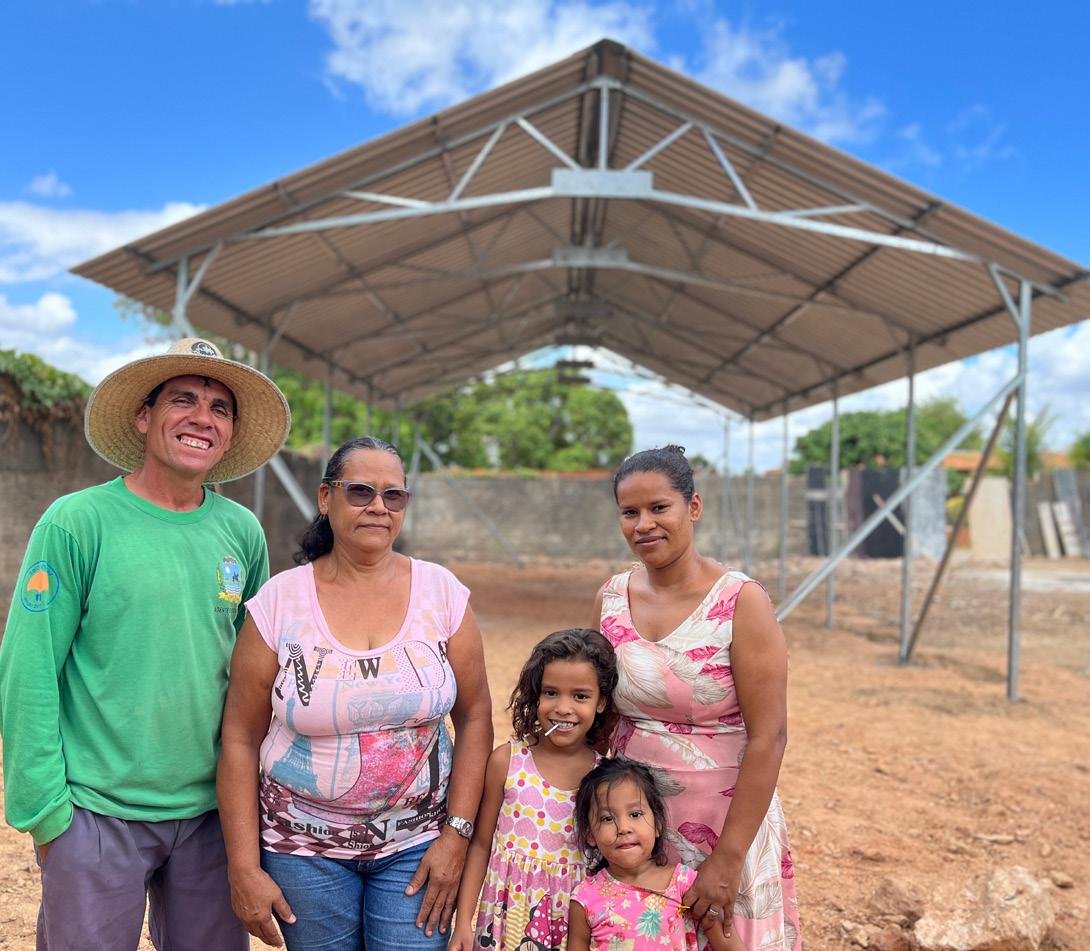
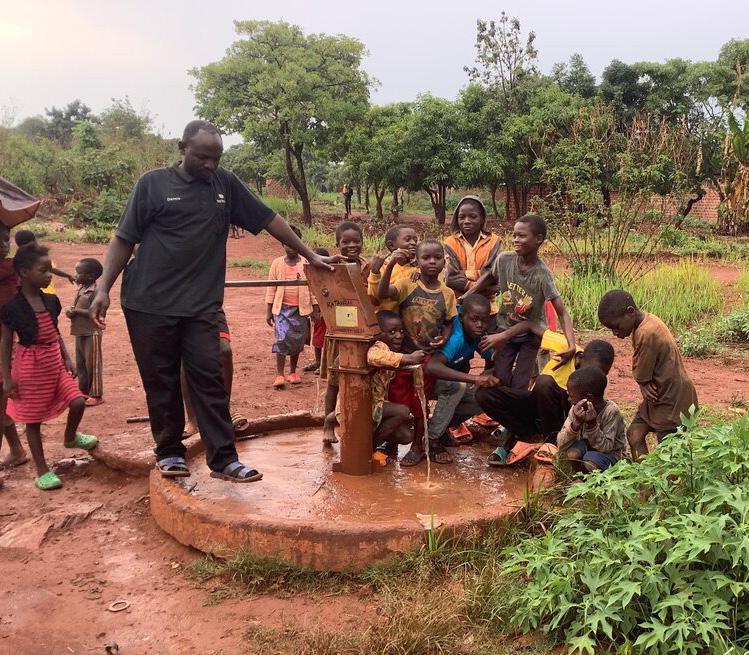
4 | THE VOLUNTEER ISSUE 1, 2024 www.maranatha.org
ZAMBIA
Our well maintenance team repairs an old well not drilled by Maranatha in the village of Katanga, restoring this precious resource to hundreds of people.
DOMINICAN REPUBLIC
Well-drilling progresses at the Don Juan Seventh-day Adventist Church, providing clean, accessible water to the entire community.
BRAZIL
Members of the Itapebussu Seventh-day Adventist Church are grateful for a strong Maranatha One-Day Church frame.
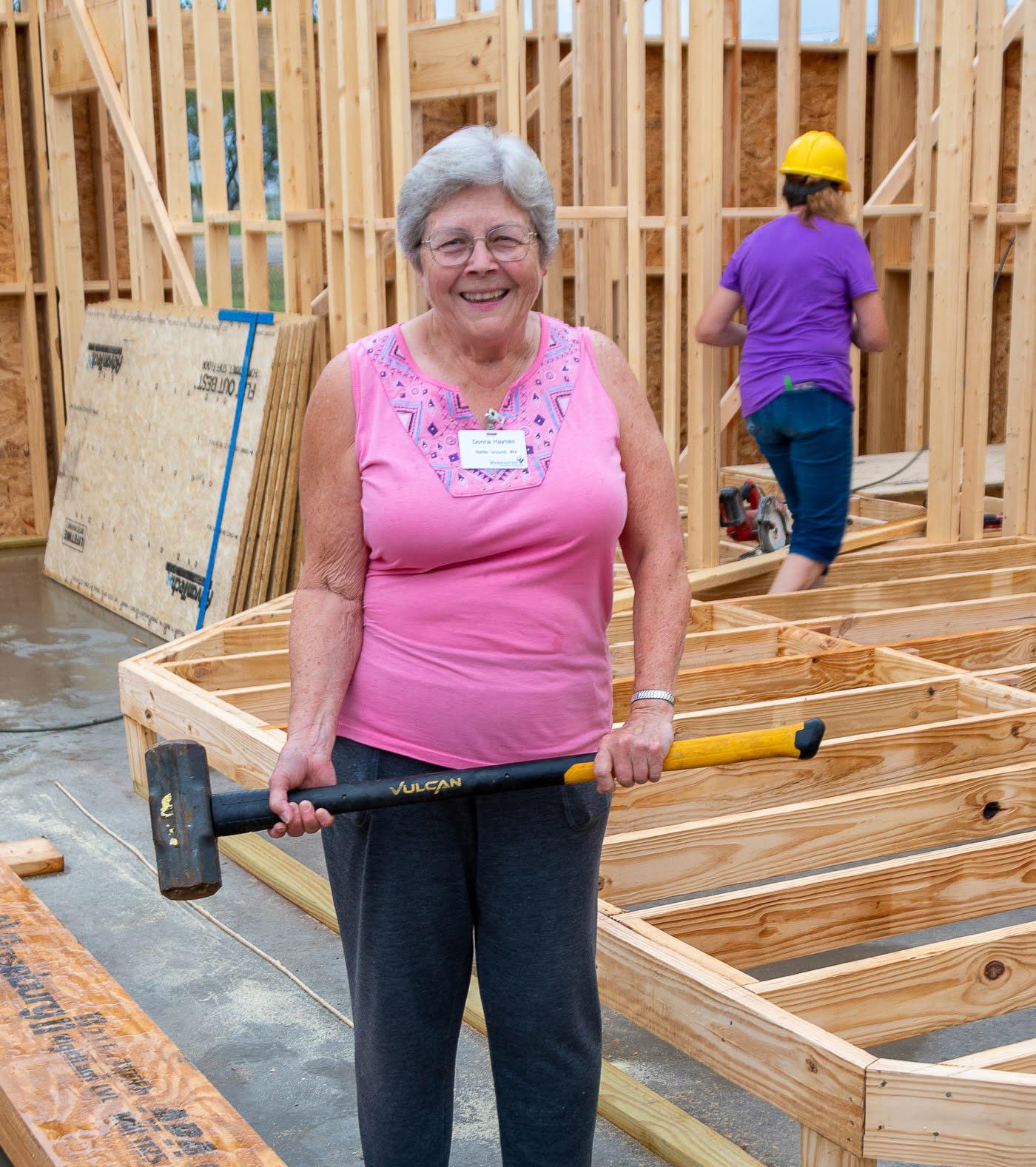
UNITED STATES
Volunteer Donna Haynes is ready with the sledge hammer as framing goes up on the Alvarado Seventh-day Adventist Church in Texas.
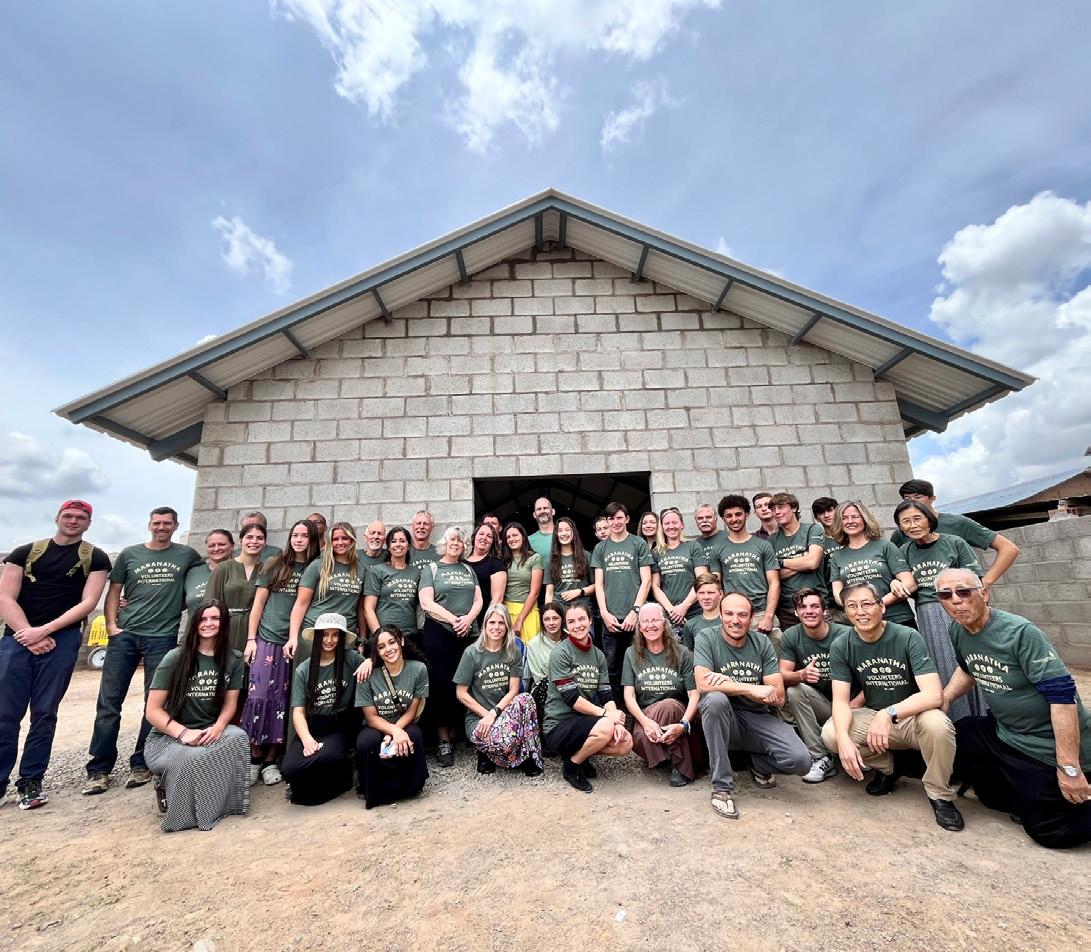
PERU
Volunteers from the Tryon Seventh-day Adventist Church in North Carolina pose in front of the Cabana Church walls they helped erect.
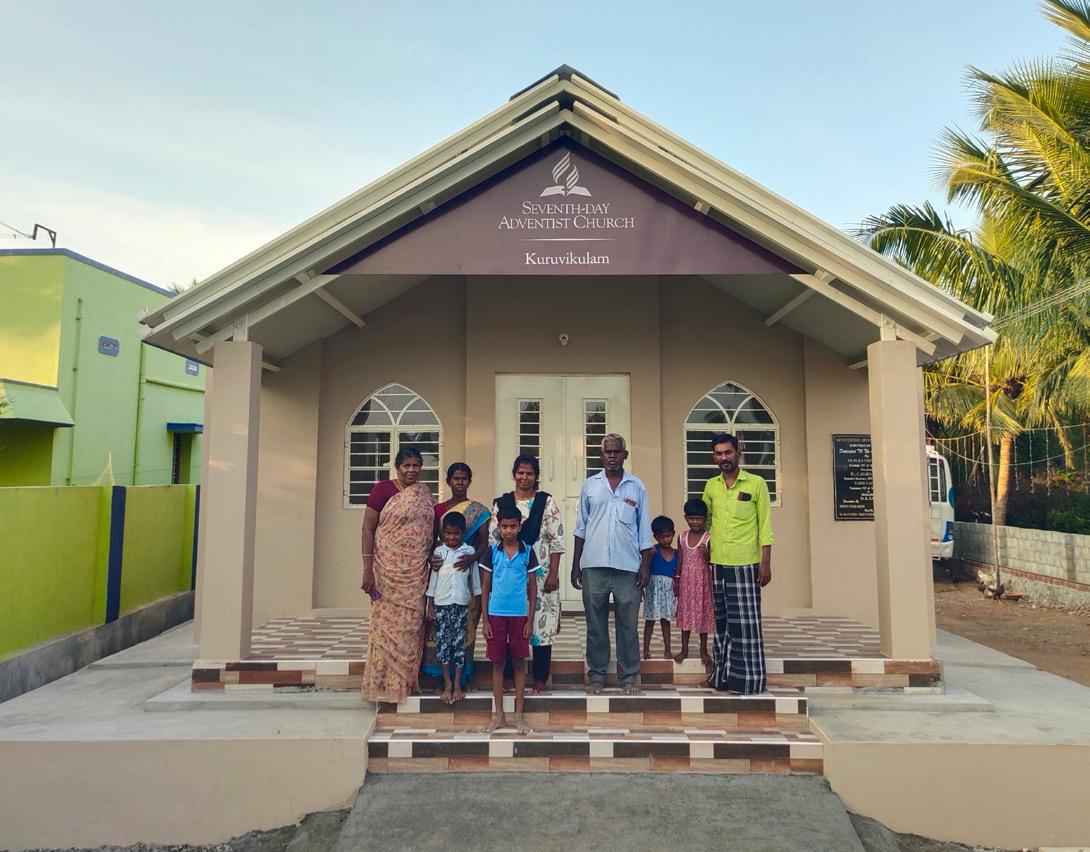
INDIA
The Kuruvikulam Seventh-day Adventist congregation is thankful for their new Maranatha-built sanctuary.
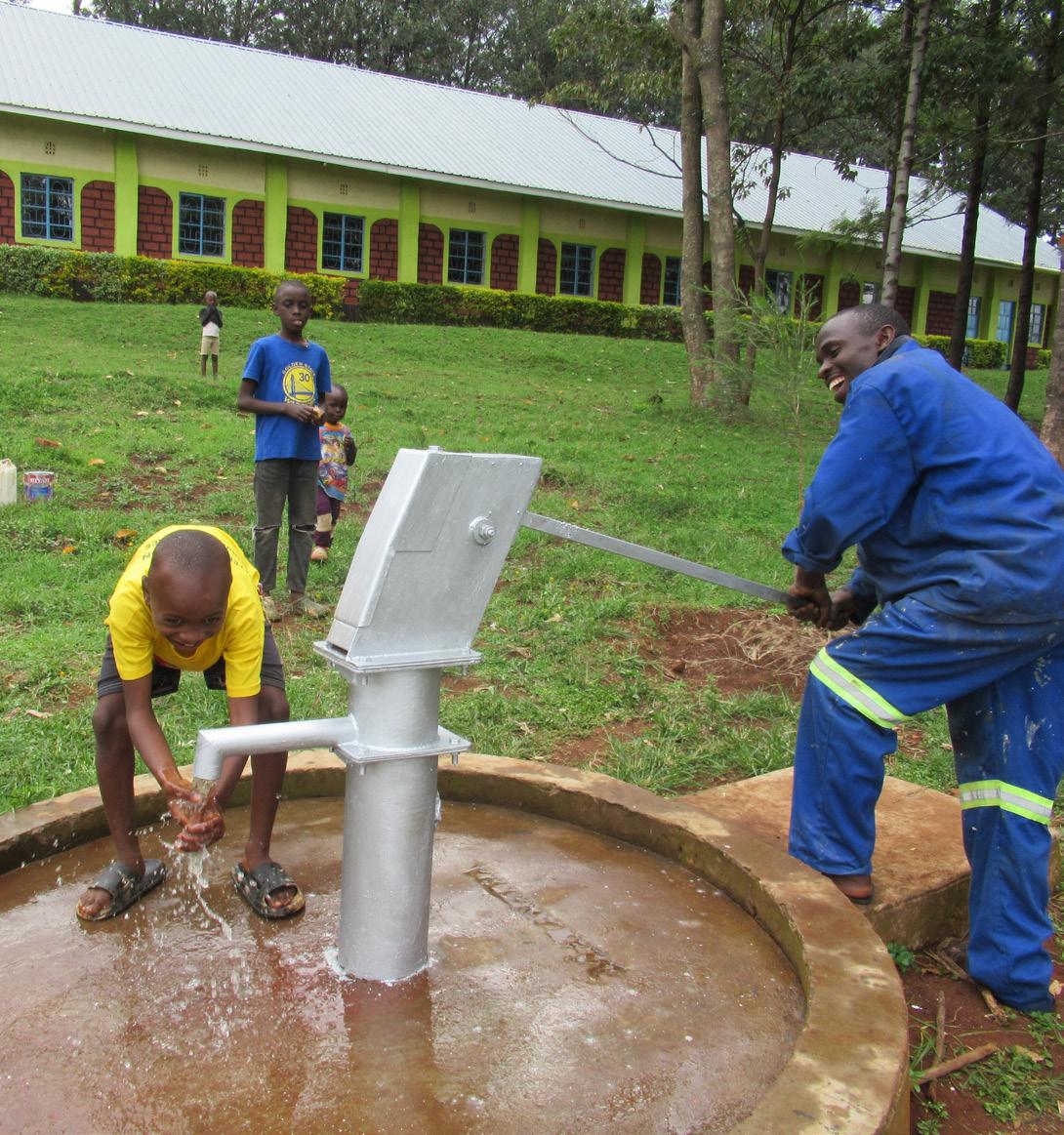
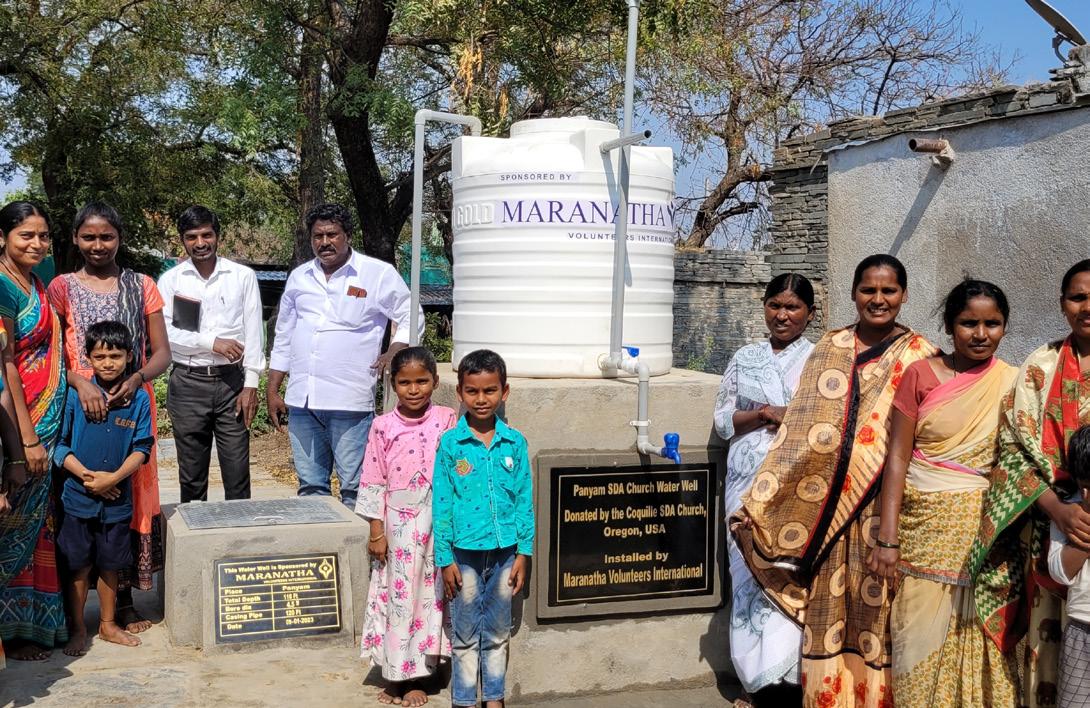
The Panyam Seventh-day Adventist Church and community has clean water at a new Maranatha well.
KENYA
After repairs were made, clean water is flowing again at the Riokindo Seventh-day Adventist Church.
KENYA
Thirikwa Seventh-day Adventist Church members are excited for their strong Maranatha One-Day Church structure.
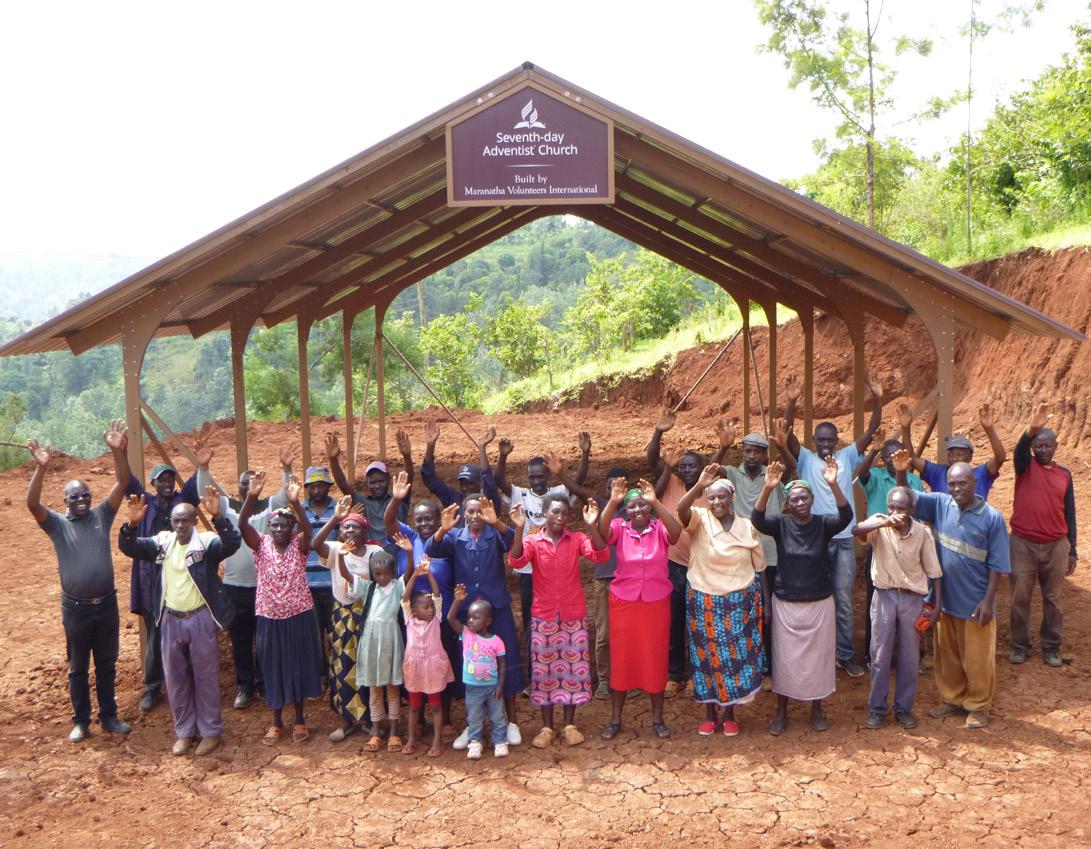
www.maranatha.org THE VOLUNTEER ISSUE 1, 2024 | 5
INDIA
News + HIGHLIGHTS
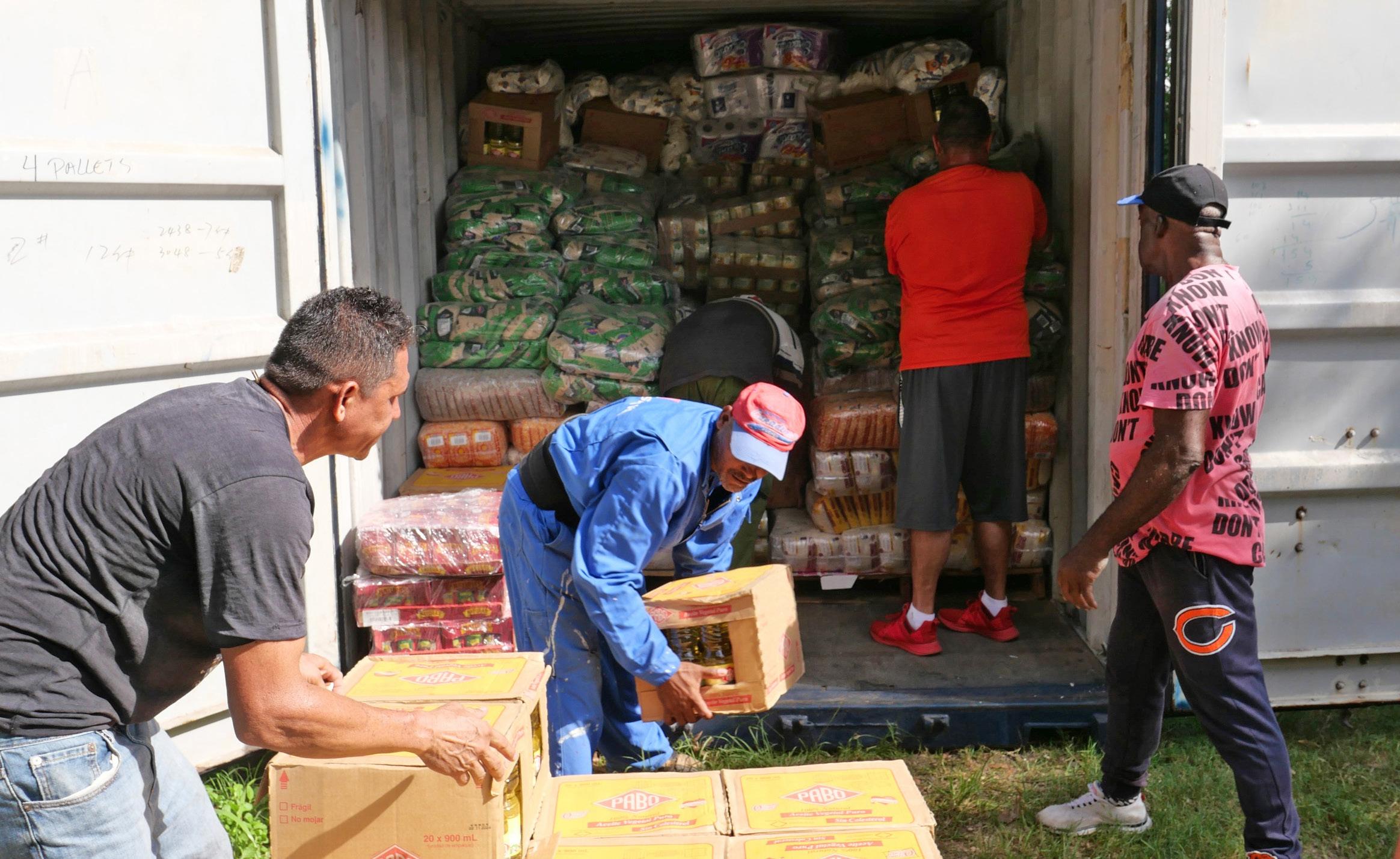
Cubans unload a container of food and other essentials, shipped by Maranatha to the Seventh-day Adventist Church headquarters in Cuba. The resources will assist communities in need, including the Adventist seminary in Havana.
ECONOMIC CHALLENGES IN CUBA
Maranatha’s work in Cuba continues to evolve in response to the country’s worsening economic climate. In the past year, the Cuban people have been struggling from a lack of affordable basic necessities, such as food, water, electricity, fuel, and medicine. “The situation is pretty horrible,” remarked President of the Seventh-day Adventist Church in Cuba Aldo Perez. “But in the middle of that, God is with His people.”
During 2022’s #GivingTuesday campaign, generous donors raised more than $250,000 for Cuba. So far, Maranatha used these funds to send four shipping containers full of food, medicine, and other essential items to distribution points across the island. These resources aided more than 5,000 families, which represent roughly 20,000 individuals. Since that first shipment, two more containers were transported to Cuba with a third
being planned for the seminary. But a country-wide labor strike shut down the nation. The supreme court in Panama ruled on the case in question on November 28, prompting the country’s gradual reopening. “It’s hard to say with absolute certainty, but we believe the containers will be on their way soon,” said Maranatha’s chief operating officer, Kenneth Weiss.
The clock is ticking for the Cuba Adventist Theological Seminary in Havana, which depends on the containers’ supplies to keep their doors open. Built by Maranatha in 1995, the institution is a pillar of Adventist Church growth on the island, but is currently struggling to feed its 70 students.
Amid economic stagnation, the 40,000-member Adventist Church in Cuba flourishes. Of the island’s 168 counties, 161 boast an Adventist presence. “The only way the people
in Cuba can survive is through faith,” explained Perez. “And we offer them faith and hope in Jesus Christ.”
To accommodate this continually expanding membership, Maranatha has purchased ten houses for renovation into places of worship. Maranatha has also received permission to start construction on a church for Nuevitas, a congregation that has been waiting for more than 30 years for a new place of worship; their existing building was condemned and eventually torn down. “It’s expensive. It’s timeconsuming. It’s complicated,” said Maranatha President Don Noble of the construction process in Cuba. But as the need for churches persists, Maranatha will keep pushing forward.
6 | THE VOLUNTEER ISSUE 1, 2024 www.maranatha.org
In late October 2023, a 23-member group wrapped up work on a clinic building in the Chipata District in eastern Zambia. Volunteers hailing from across the United States laid block walls for the structure, which will serve as the primary healthcare infrastructure for a community of more than 10,000 people in 16 surrounding villages. When completed, the clinic will include examination rooms, offices, storage, labor and delivery rooms, and a waiting room. It is named “Rachelle’s Place of Healing,” in memory of the late daughter of Maranatha’s country director for Zambia, David Woods, and his wife, Susan.
A PLACE OF HEALING IN ZAMBIA 2023 IN NUMBERS
Maranatha’s work is best represented by stories of the individuals who experience it firsthand, like volunteers, local crews, and project recipients. But a bigpicture perspective, gained through data, can also offer a valuable view of what God has made possible. A look at this year’s figures reveals an unwavering truth: God has blessed the Maranatha mission immensely in 2023. Crews and volunteers have built 400 church structures, worked on ten school campuses, drilled 680 water wells, and carried out 922 well maintenance and repair check-ins (both in person and over the phone) in eight countries. They’ve also completed several uncategorized projects, like a medical clinic in Zambia and numerous renovation projects at 14 Seventh-day Adventist Church organizations across
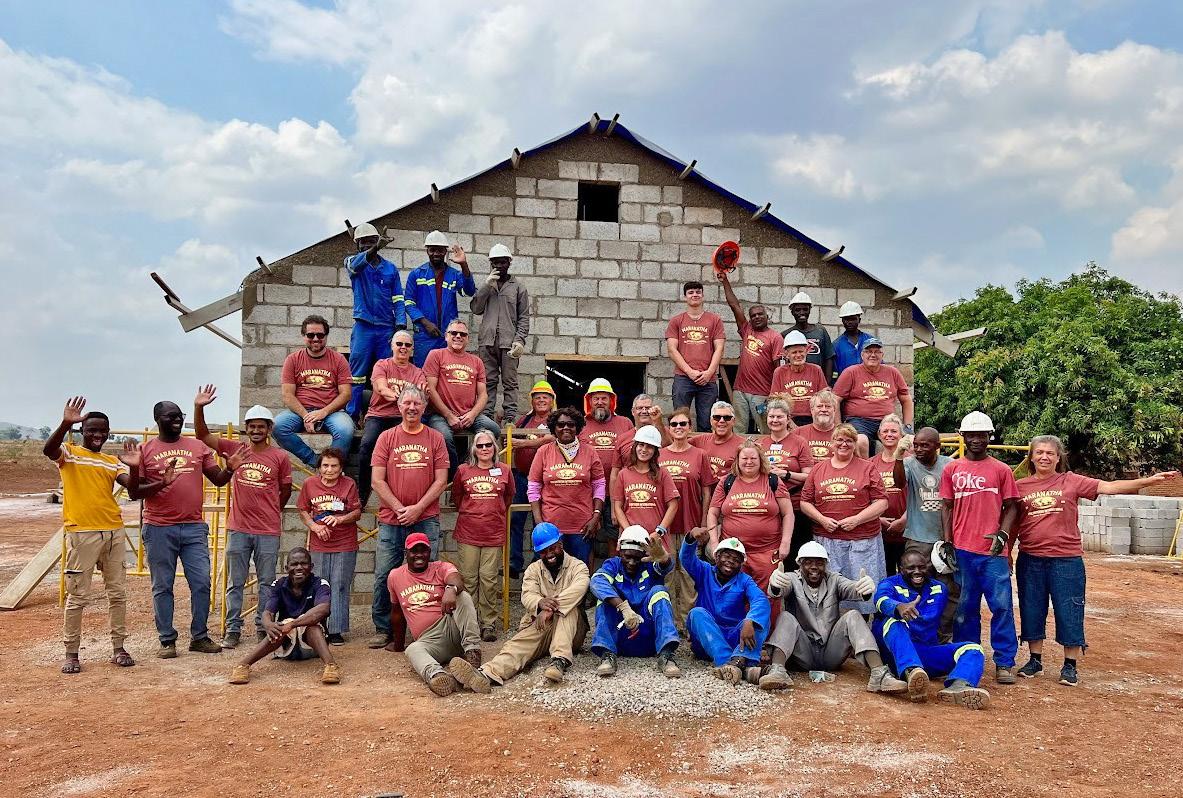
“The clinic is in honor and memory of our baby girl, Rachelle,” said David. “This made the project have a deep impact on me, thinking of the mothers that can bring their children to Rachelle’s Place of Healing for care and, hopefully, for a better life.”
Rachelle’s Place of Healing is located near the Bethel Seventh-day Adventist Church building, which Maranatha built in 2015. In addition to construction work on the clinic, volunteers operated
a three-day, pop-up medical clinic out of the church’s sanctuary. These healthcare professionals saw approximately 400 patients in one day and about 750 total. This impressive turnout demonstrates the dire need for a permanent clinic in this area.
North America.
This year
2,460 volunteers participated in Maranatha projects in seven countries around the world, and 1,124 of these were first-timers!
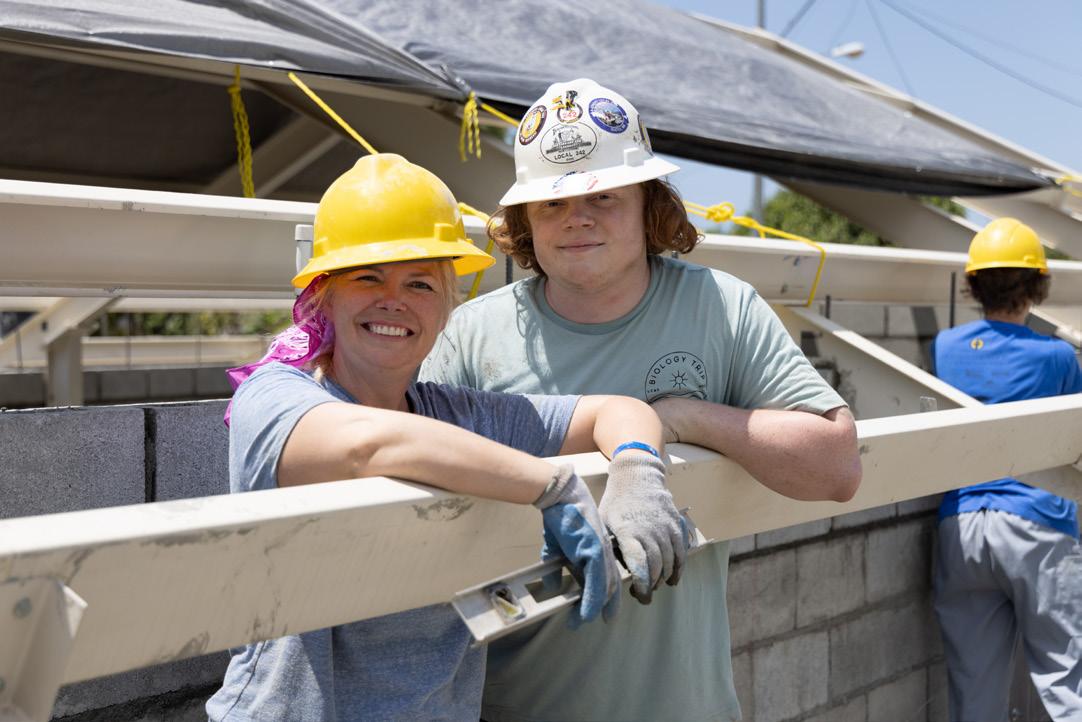
The United States saw the most volunteers in 2023, with a total of 975. The Dominican Republic came in second, with a total of 843. Kenya had 249. Peru and India tied with 158. Zambia had 44, and Canada had 33.
Says Kyle Fiess, vice president of projects, “From a bird’s-eye perspective, the numbers from this year show that our teams were busy and accomplished what they set out
to do. We were successful in achieving our goals. From a more intimate perspective, every single one of our projects was a miracle, and I’m very grateful that God has blessed us in a way that we have been able to accomplish what we have.”
www.maranatha.org THE VOLUNTEER ISSUE 1, 2024 | 7
A DIFFERENT KIND OF Island
Maranatha is tackling church construction in the Peruvian City of Iquitos and remote rainforest beyond.
By Sidney Needles
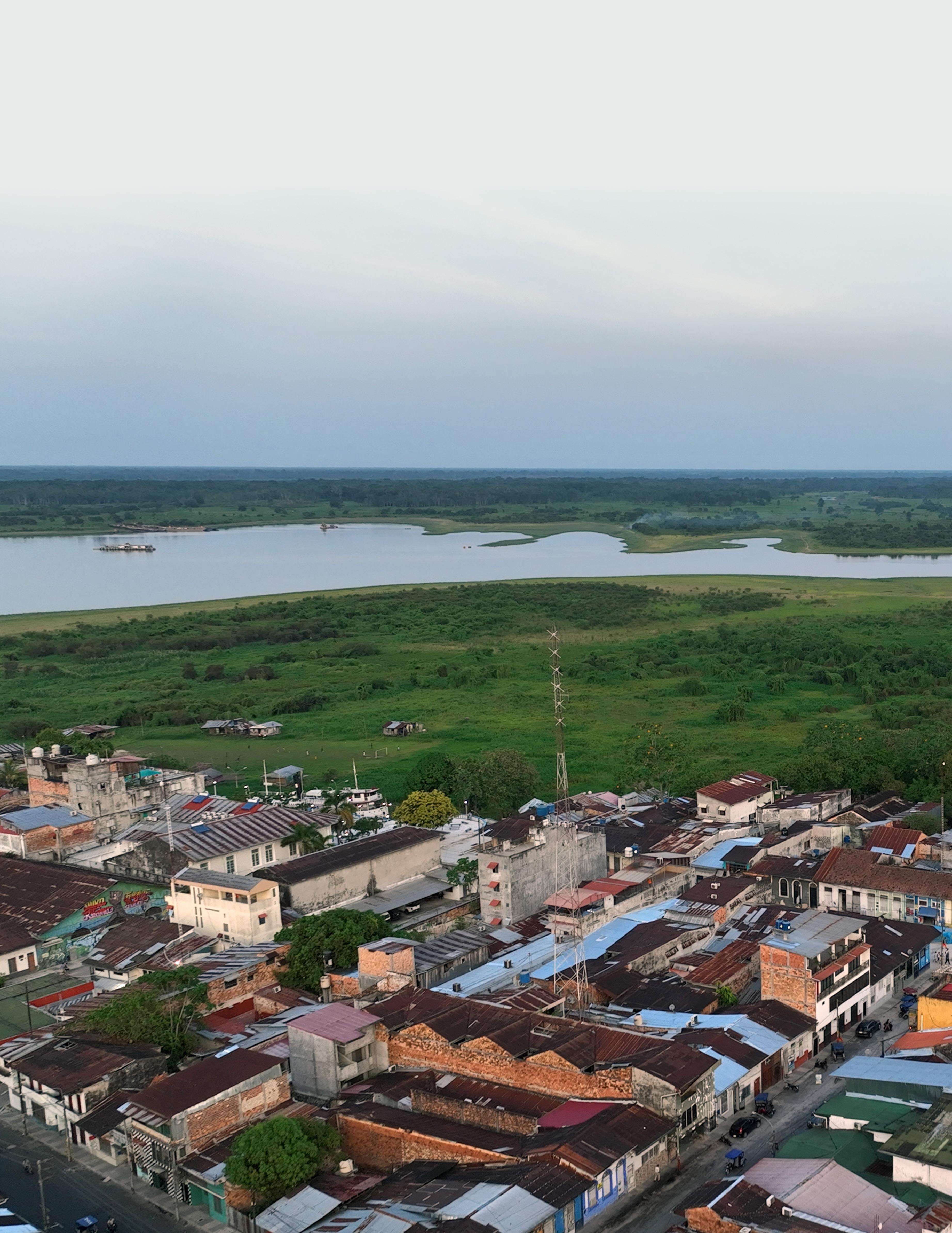 Photo by Leo Macias
Photo by Leo Macias
Close your eyes and imagine a tropical island. What scenes come to your mind?
Sun-baked beaches littered with fallen coconuts? Reefs teeming with vibrant aquatic life? A volcano piercing an emerald blanket of foliage? These are all characteristics of the quintessential tropical island. But this year Maranatha Volunteers International is headed to a “tropical island” that looks very different. This one isn’t edged in sandy beaches and doesn’t have a smoking volcano at its center. It’s not even completely surrounded by water. While not technically an island by the standard of
geographic terminology, this “island” has earned the title through its acute inaccessibility.
Located in the Great Plains of the Amazon Basin in northeast Peru, Iquitos is the world’s largest landlocked city that is reachable only by boat or plane. Similar to how a literal island is surrounded entirely by water, Iquitos is surrounded by dense jungle, swamps, and rivers that prevent road construction. Despite its limited accessibility, Iquitos is a thriving center of commerce and industry for the Amazon Rainforest. Boasting nearly 500,000 inhabitants, it has earned the nickname “Capital of the
Peruvian Amazon.”
Iquitos lies within one of the largest Seventh-day Adventist missions (a Church conference that is not yet self-sustaining) in Peru. Regardless of its financial dependency, this mission’s number of constituents (30,000) is expanding, thanks to its members’ evangelistic mindset. “The motive isn’t only to go to heaven,” says retired Bible worker Richardo Pinchi Fababa. “I want my brothers to go too, because that is our goal for being here.”
In the United States, most worshippers pick a church to attend long term. But worshipers in Iquitos attend a church in the hopes of one
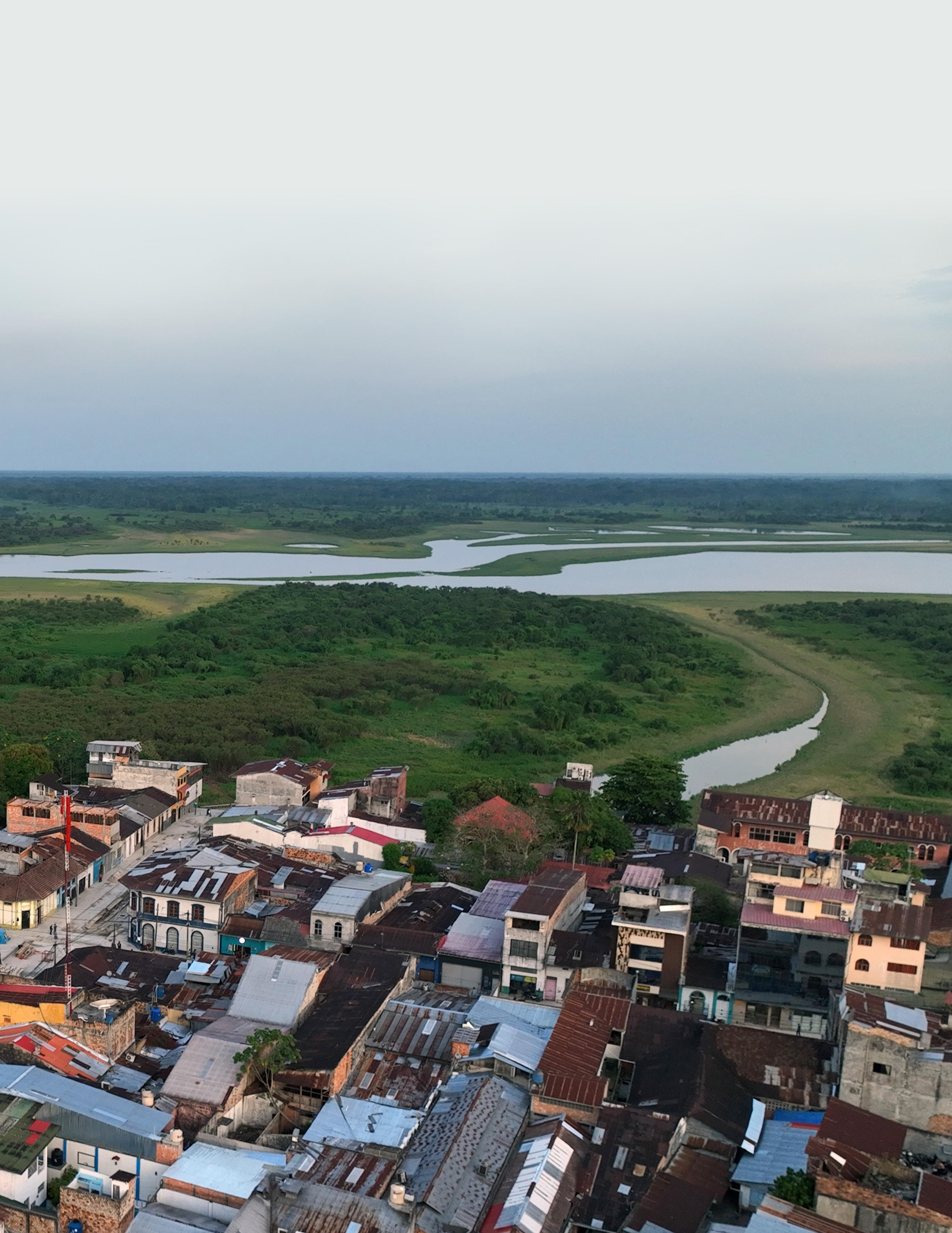
The city of Iquitos is a commercial and industrial center for the Peruvian Amazon Rainforest. This thriving metropolis is sometimes called an “island” because it’s surrounded by dense jungle and rivers that make it unreachable by road.
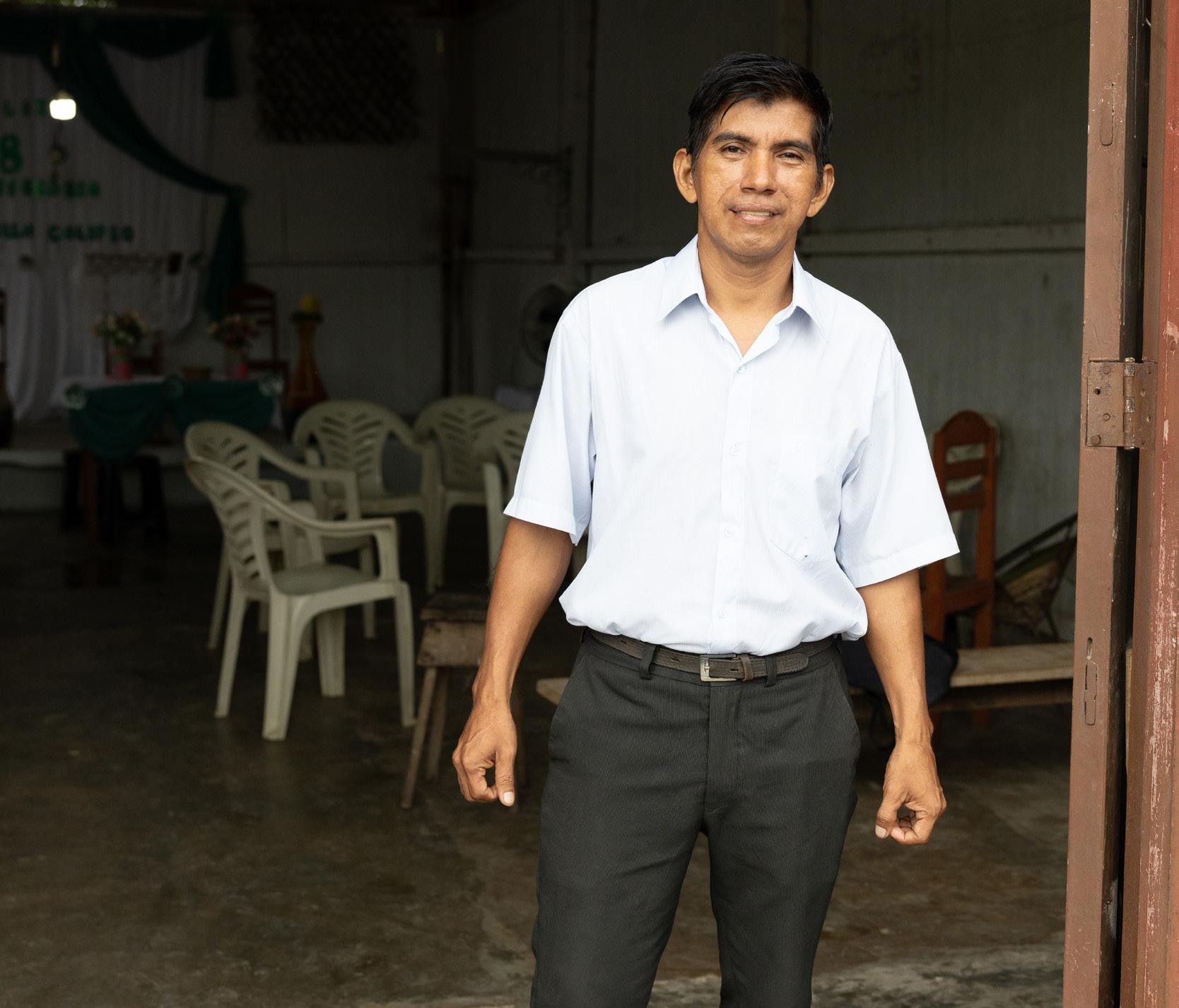
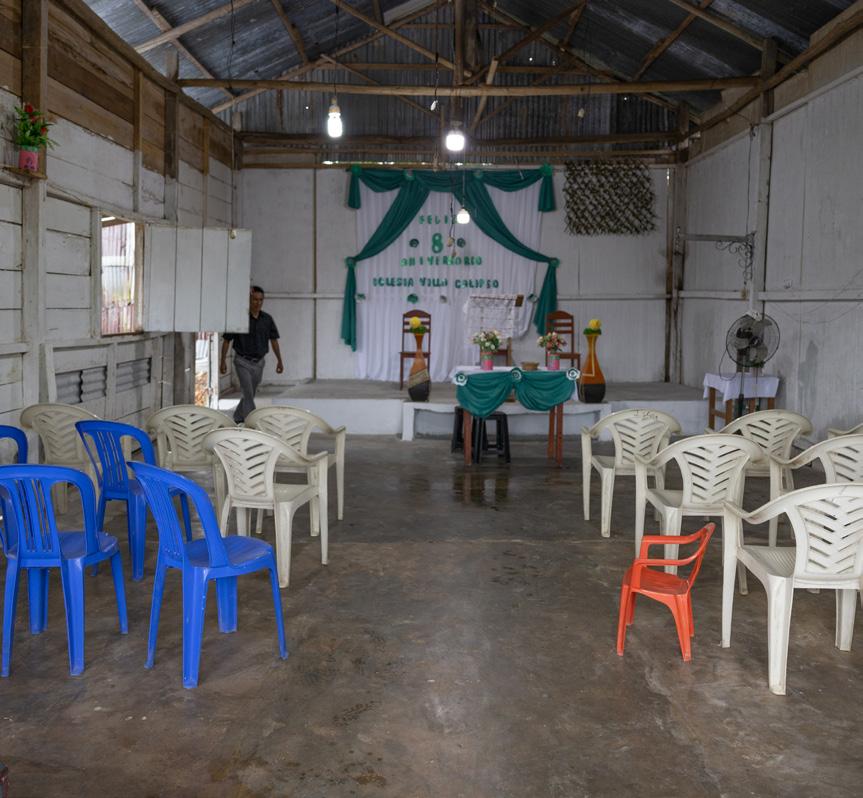
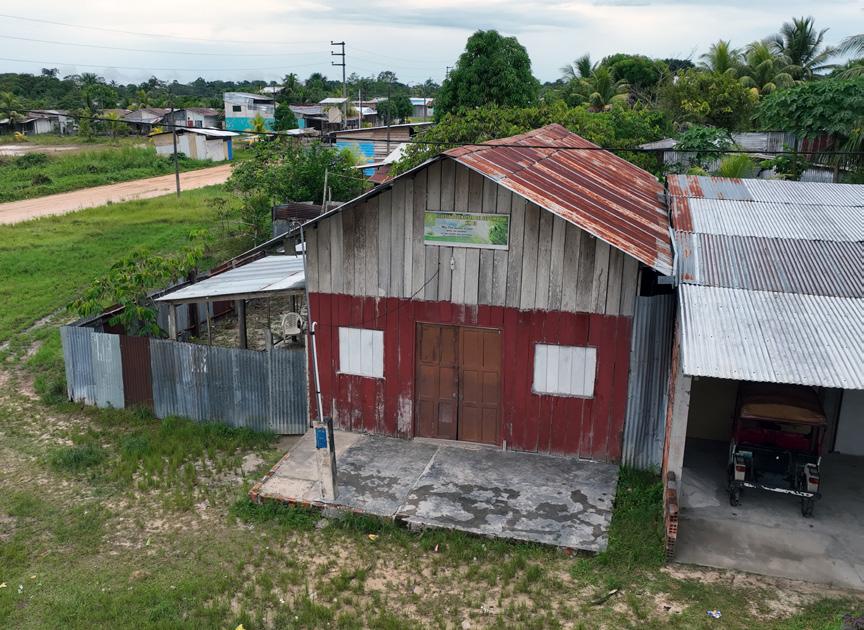
day leaving it. This attitude may sound noncommittal, but members are actually strongly committed–to planting new churches. They want to branch off from larger congregations to start smaller ones in new communities, enacting a snowball effect of evangelism.
“They want to grow. They want to reach their community, but they have this need for infrastructure.”
Most of these smaller neighborhood groups in Iquitos lack adequate places of worship. They meet in dilapidated, repurposed structures or members’ cramped homes. Wind and rain seep through holes in walls and roofs, and are sometimes loud enough to render church services completely inaudible. These accommodations pose a serious hindrance to evangelism efforts. Worshipers struggle to invite visitors to spaces lacking sufficient sitting room and protection from the elements. Additionally, a church without an official building often gives off an air of illegitimacy and is not taken seriously by the community. “They want to grow. They want to reach their community, but they have this need for infrastructure,” says Elmer Barbosa, Maranatha’s country director for Peru.
In the mid-2000s, Maranatha responded to the request of the Adventist Church in East Peru to help rectify this situation. Crews and volunteers constructed church buildings and other urgently needed structures in the northern Amazon region of Peru, including certain neighborhoods in Iquitos. The buildings’ steel parts have proven strong enough to withstand the elements, and their roofs were designed to reflect the sun’s heat and dim the sound of rainfall. This wave of new infrastructure was a catalyst for evangelism to roll through the city’s streets once again.
But the church buildings from decades ago are reaching max capacity, and members are leaving to form congregations in new neighborhoods. To meet this renewed demand for places of worship, Maranatha is returning to northeast Peru this year to build 20 church structures and six classrooms for communities in Iquitos and the surrounding rainforest.
Josue Salazar Huayta is a member of one such congregation in Villa Calipso, a neighborhood on the outskirts of urban Iquitos. When skies are clear, the Villa Calypso church is usually full. But many days—as it rains about 200 days out of the year in Iquitos—most of the church’s white plastic chairs are left vacant. When
10 | THE VOLUNTEER ISSUE 1, 2024 www.maranatha.org 3 2 1
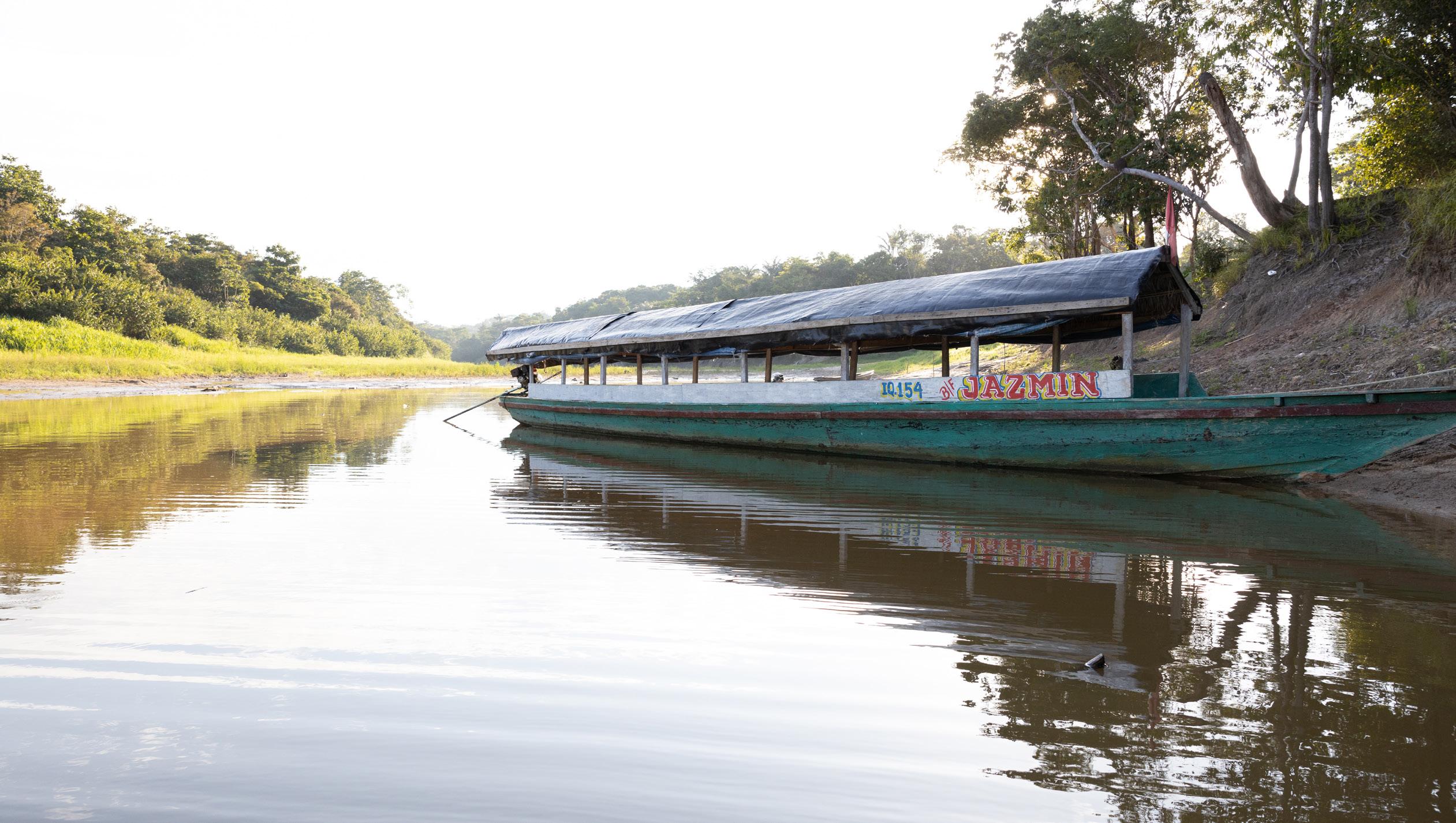
sheets of rain pelt the tin roof of the rudimentary worship structure, the noise drowns out the speaker’s message. Members usually opt out of the muddy march to watch an inaudible service; Josue doesn’t blame them. The few who attend church despite the rain must dodge drops of water that infiltrate their church building’s leaky roof.
Rain is technically what brought Josue to Villa Calipso in the first place. More than a decade ago, this entire area was nothing but a tangle of untamed foliage. Then a sizable flood swamped Iquitos, claiming property and livelihoods. The local government offered free plots in Villa Calipso for those whose own land was in the flood zone. Josue’s brother joined the environmental refugees and convinced Josue to do the same.
During his early years in Villa Calipso, Josue was a security guard and hosted weekly Sabbath worship services at the office where he worked. When his supervising captain learned of this, he urged Josue to request land from the government on which to build an official church building. After a couple years of waiting and worshiping in various members’ homes, the government granted them a plot in 2014. Within two weeks they built their church structure’s walls and roof, eventually adding a concrete floor underneath.
Ten years later, the congregation remains
in this original structure. Despite thorough efforts to repair the deteriorating building, it continually falls into disrepair. There are latticework patches of termite damage across its weight-bearing beams and leaks in its roof. “We need construction with stronger materials,” Josue murmurs and releases a deep sigh. He dreams of a church building respected by the Villa Calipso community–a strong structure to help share God’s love with neighbors and friends. How long can his congregation continue to spare the money for temporary church repairs?
At night, the city of Iquitos is an island of light, glowing in stark contrast with the pitch black expanse of dense jungle and winding rivers beyond. But this nocturnal juxtaposition shouldn’t be equated with that of human presence and absence. On the contrary, dozens of indigenous tribes have dwelled among the Peruvian Amazon’s thick rainforest for generations. Most villages live exclusively off the natural resources around them, with little contact from the outside world. Transportation to and from these communities occurs mainly by boat, but small planes are also necessary to reach some of the more remote locations.
Despite overwhelming isolation, the gospel is spreading throughout the jungle beyond
MEETING A NEED:
1 Josue Salazar Huayta helped establish the Villa Calipso Adventist Church in 2012.
2 After the local government granted this congregation a plot of land in 2014, they built their current church building’s walls, roof, and floors.
3 The Villa Calipso community is excited for Maranatha to build them a church structure that mold and insects can’t destroy.
4 Transportation to and from the jungle villages beyond Iquitos occurs mainly by boat.
www.maranatha.org THE VOLUNTEER ISSUE 1, 2024 | 11
4
PHOTOS: (1-2, 4) CHRISTINA LLOYD (3) LEO MACIAS
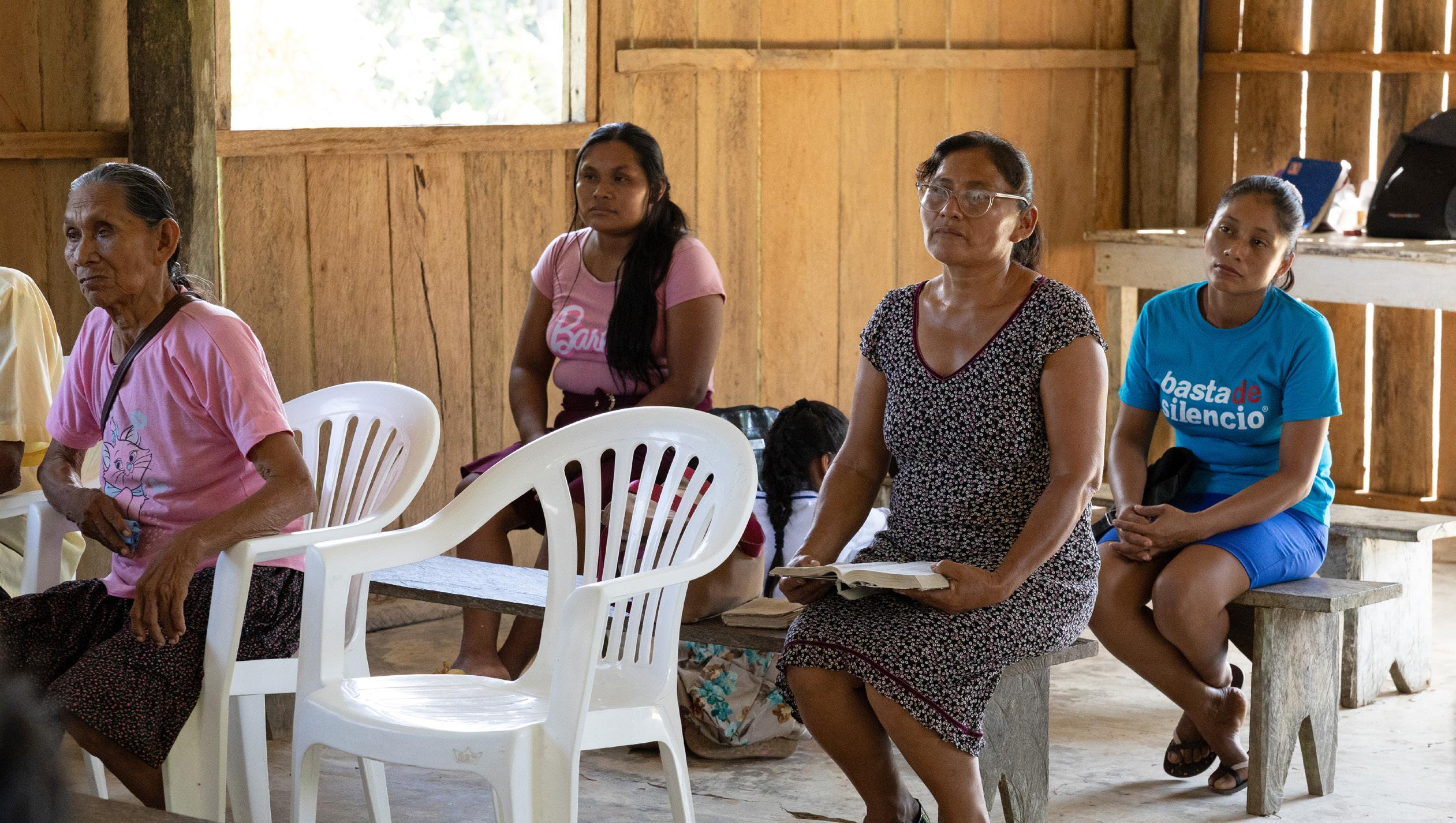
Iquitos. This is largely thanks to an Adventist nonprofit organization called “Peru Projects,” which has brought medical and evangelistic missionaries to this area since the late 1990s. After decades of Peru Projects’ outreach, 82 of the thousands of communities in this jungle region have an established Adventist church or relational contact with a missionary.
“We are very grateful to Maranatha because they will help us have churches ... that are more durable.”
Maranatha will aid this gospel spread in the Peruvian rainforest by constructing places of worship here in 2024. “Just like those sprouting congregations in Iquitos, those in the jungle are in need of solid church structures,” says Elmer. Maranatha’s steel frames are especially desirable in this biome known for wood-eating moisture and insects. “The churches are mostly wood. And wood–no matter how strong it is–always fails,” remarks Josué Cuba, pastor for churches in the Nauta Requena Missionary District. “We are very grateful to Maranatha because they will help us have churches … that are more durable.”
But construction in this remote jungle region will be difficult. “Here it is a unique reality because there are churches where you can visit by road–which are only three or four churches–and the rest are [reachable] by boat, depending on the places,” says Josué. Crews will fabricate steel parts in the central Peruvian city of Pucallpa and transport them, along with other materials, equipment, and personnel, to each remote construction site. This process is costly and time-consuming, but well worth the effort. “We will have to haul tons of steel in little boats, with gravel and cement, to reach places where people feel like they have been forgotten,” Elmer shares.
Mirta Rosa Goñas-Inga lives in one such forgotten place. On Sabbath mornings, she strolls through the stilted huts of Loboyacu Village, towards the grassy hill on which her wooden church building rests. The single concrete path through her village is wide enough to fit a single mototaxi, but nothing more. At Loboyacu, there are no cars, buses, or trains. There are no restaurants, libraries, grocery stores, or pharmacies. Some might balk at her remote existence, but Mirta adores her family-filled community and feels “it is a blessing to be able to live here.”
Mirta’s biological father died of cancer when she was young. At the time, her
12 | THE VOLUNTEER ISSUE 1, 2024 www.maranatha.org
1
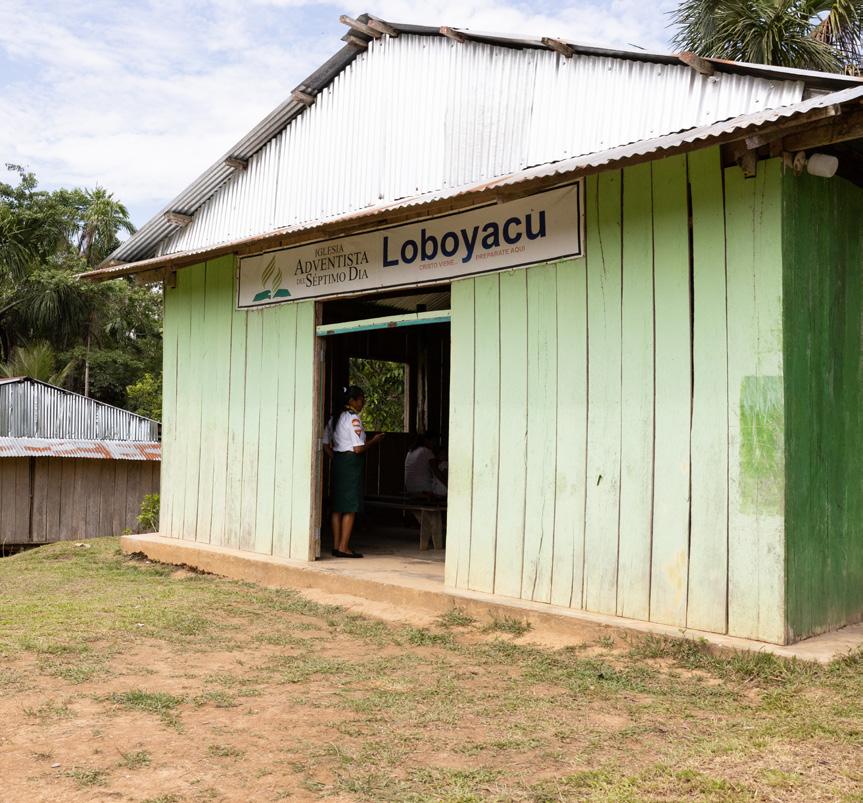
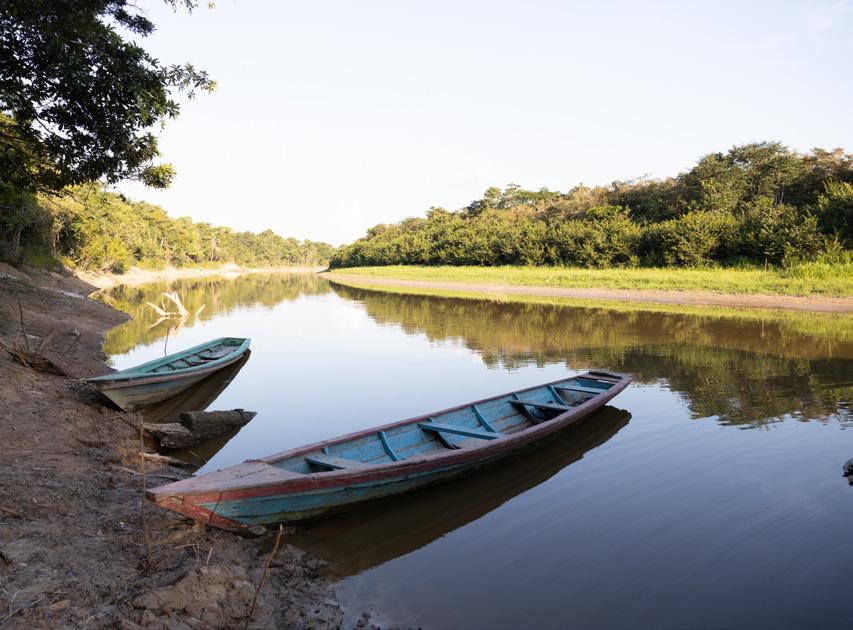
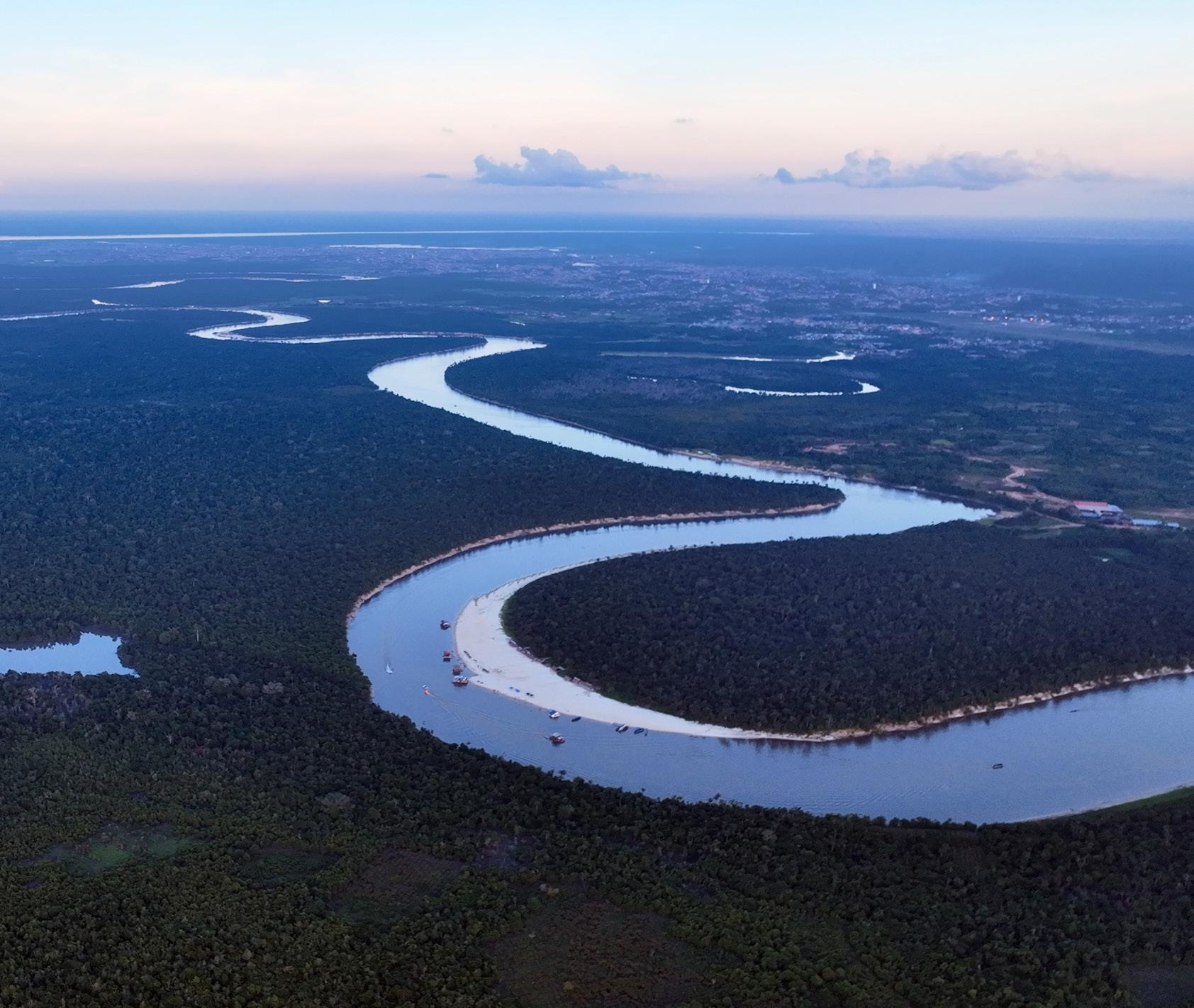
family lived in a village far from Loboyacu, but just as remote. Her father’s passing did not come as a surprise. In the jungle–without access to doctors or clinics–even moderate illnesses are lethal. Her single mother struggled to provide for Mirta and her seven siblings, until her marriage to a kind Adventist man, who helped support them. Mirta is eternally grateful to her stepfather for two specific things: moving their family to the loving Loboyacu community and introducing her to hope in Jesus. She will tell anyone who asks, “We grew up, perhaps orphans of our first father, but God gave us the father that we have today.”
As a longtime member of the Loboyacu Adventist Church, Mirta has seen it grow from a handful of believers to its current 45 members. In the early 90s, the Adventists in her village decided to invite a pastor to help them establish a church. The group worshiped in a school for 15 years, until village authorities granted them a piece of abandoned land to construct a church building on. Mirta remembers her congregation saving for two years before building the structure’s roof and another three before adding the wood plank floor.
The Loboyacu church family has worshiped in their completed structure for years now, but it never stays intact for long. The congregation is always collecting offerings for repairs, trying
in vain to keep up with the rot and termites that eat away at their wooden structure. “The plan of the church is to preach the gospel until Christ returns,” Mirta recalls. But it’s so hard to invite guests to their deteriorating building, and their remote location makes the purchase and transportation of materials expensive. Mirta wonders if there’s hope for her beloved congregation to continue growing, or if it will waste away like their church structure.
Iquitos and the surrounding rainforest are full of many more stories of passionate believers like Josue and Mirta. Most of these stories are stuck on a chapter of insufficient and deteriorating infrastructure. But Maranatha crews and volunteers will overcome arduous journeys and logistical challenges to write the next one. It’s one in which Josue doesn’t have to wonder when his church building’s roof will cave in, and Mirta’s jungle congregation continues to grow within a sturdy structure.
“You know, Jesus has not forgotten about those people there,” Elmer says. “The Church has not forgotten about them. And Marantha can demonstrate this by providing strong structures that will arrive, via river, from thousands of miles away, showing the people of the central jungle of Peru that we have a mighty God, and He cares for them.”
THE JUNGLE BEYOND:
1 Mirta Rosa GoñasInga is a member of the Adventist congregation in the remote jungle community of Loboyacu
2 Loboyacu’s Adventist church building is constantly falling into disrepair and stressing out worshipers who can’t afford to keep fixing it.
3 Visitors to Mirta’s rainforest dwelling must travel by boat, then mototaxi.
4 Maranatha will transport materials and personnel to remote jungle construction sites via river. This process will be costly and time consuming, but well worth it.
www.maranatha.org THE VOLUNTEER ISSUE 1, 2024 | 13
PHOTOS: (1-3) CHRISTINA
LLOYD (4) LEO MACIAS
3 2 4
SPACE FOR Sala
How Maranatha is making room for learning and living at a special school in Zambia.
Story and photos by Dustin Comm
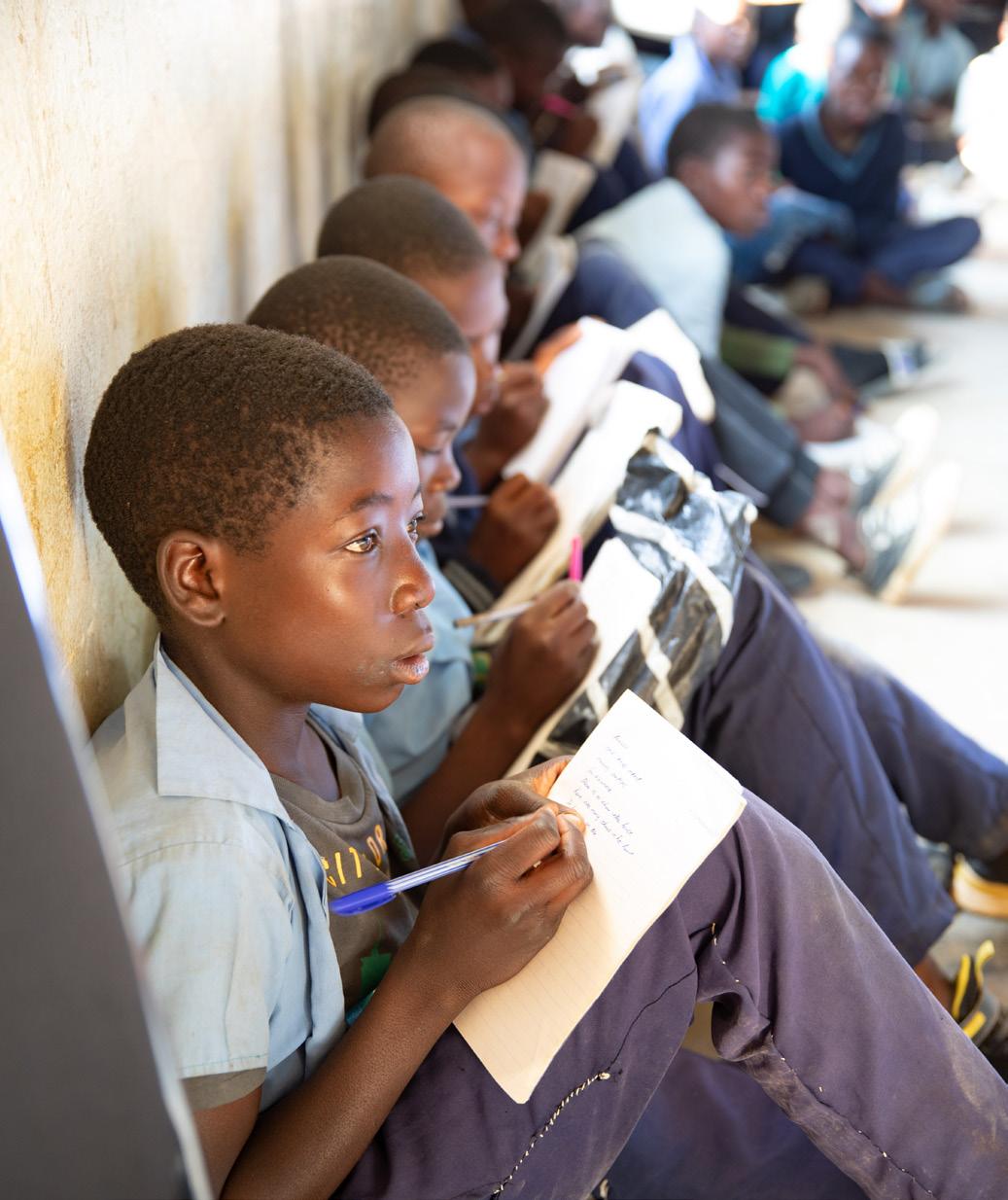
Maureen Chitanetilo had been sitting on the concrete floor for hours throughout the day. Seven hours to be exact. Her backside started going numb in the late morning or early afternoon. Her young body was tired, and even more, her soul ached to just move, to get off the floor. But she couldn’t. And neither could any of the other students she sat with— more than 100. They were stuffed into their classroom like sardines. When there was no more space on the floor, some of the younger kids sat on each other’s laps. All while trying to listen to lessons and write on notebooks spread over their thighs or on the floor.
“We wake up at home to go for work in order to deliver, only to discover that you have not delivered to the expectations because maybe a great number of the pupils have not been attended to.”
This is life at the Sala Adventist School in Zambia. More than 1,300 students attend this longstanding institution (it celebrated its centennial anniversary in 2022), but there are only 12 classrooms. With preschool through 10th grade, that’s an average of around 108 students in each class. Some classes have less than 100, while some have up to 147. It’s a student to teacher ratio that is unfair to everyone. Children not only endure the physical
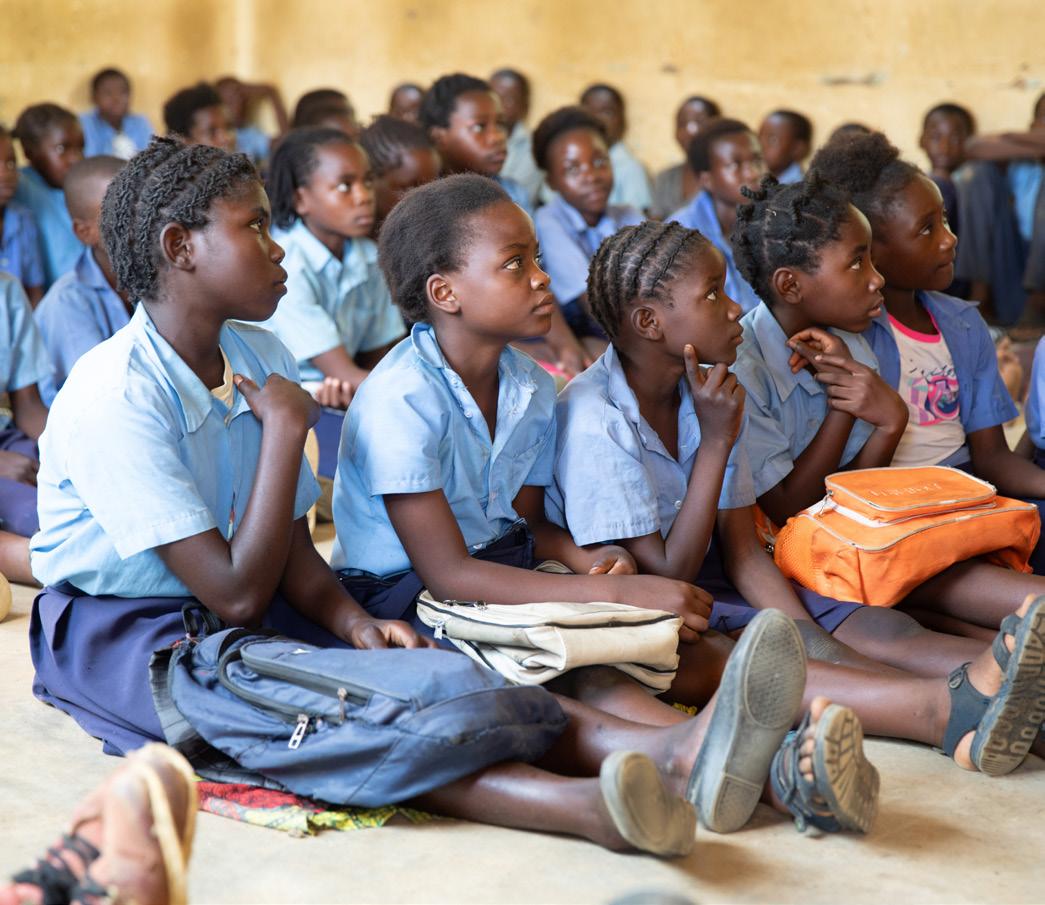
discomfort of sitting shoulder to shoulder with their classmates on the ground all day, but also face constant distractions from this mass of students, some who have no chance of seeing the board or hearing the lecture as they sit in the back of the classroom.
For teachers, the task is nearly impossible. With more than 100 students in a classroom, roll call can take up to 15 minutes in a 45-minute period. And grading? Instructors barely look over one day’s completed work by the time they go to sleep, leaving them very little time to prepare for the next day’s lessons. The idea of giving extra attention to students who need it is a laughable dream.
“Our desire as teachers is that you need to attend to the needs of a child,” explains Sala
14 | THE VOLUNTEER ISSUE 1, 2024 www.maranatha.org
1 2
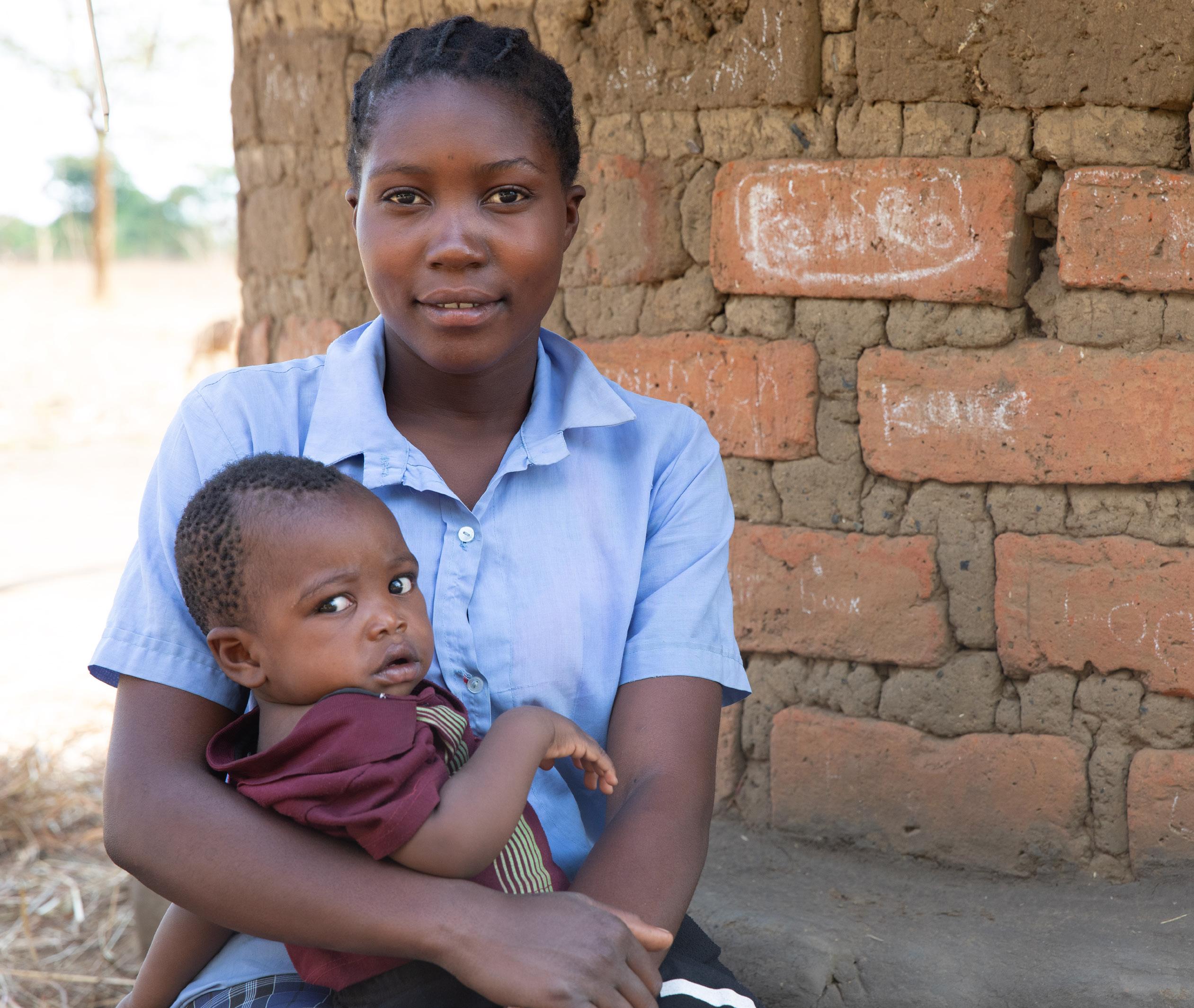
Principal Christopher Kapanduloa. “And when you have failed that particular day, saying, ‘I’ve not done much because I have not gone to an extent where they’ve all understood.’ That brings frustration to a teacher. We wake up at home to go for work in order to deliver, only to discover that you have not delivered to the expectations because maybe a great number of the pupils have not been attended to. That’s the major frustration.”
It’s an unfortunate situation which has compounded in the past couple of years due to the government making education free for all children in Zambia. It’s an arrangement called “grant aid,” and it provides funding for teachers while still affording Adventist
schools the autonomy to direct curriculum and foster a faith-based atmosphere. Since this policy was implemented, many kids who couldn’t afford school are continuing where they otherwise might have stopped, and those who did stop have returned. Students like 16-year-old Maureen.
After getting pregnant two years ago, she dropped out of school. Her husband told her she should just stay home, be a wife and mother, and not worry about an education. Maureen eventually gave birth to her son and, in time, realized that the only way to give him a better life was to do exactly what her husband condemned.
“The husband of mine refused me to come to school,” says Maureen. “He just said, ‘No,
CROWDED CLASSROOMS:
1 There are so many students at the Sala Adventist School, children sit shoulder to shoulder with their classmates on the floor.
2 Often more than 100 students fit into classrooms that make teaching and learning an impossible task.
3 Maureen Chitanetilo attended Sala for years until she became pregnant with her son. Today, she’s returned because she knows her education will help to improve his future.
www.maranatha.org THE VOLUNTEER ISSUE 1, 2024 | 15
3
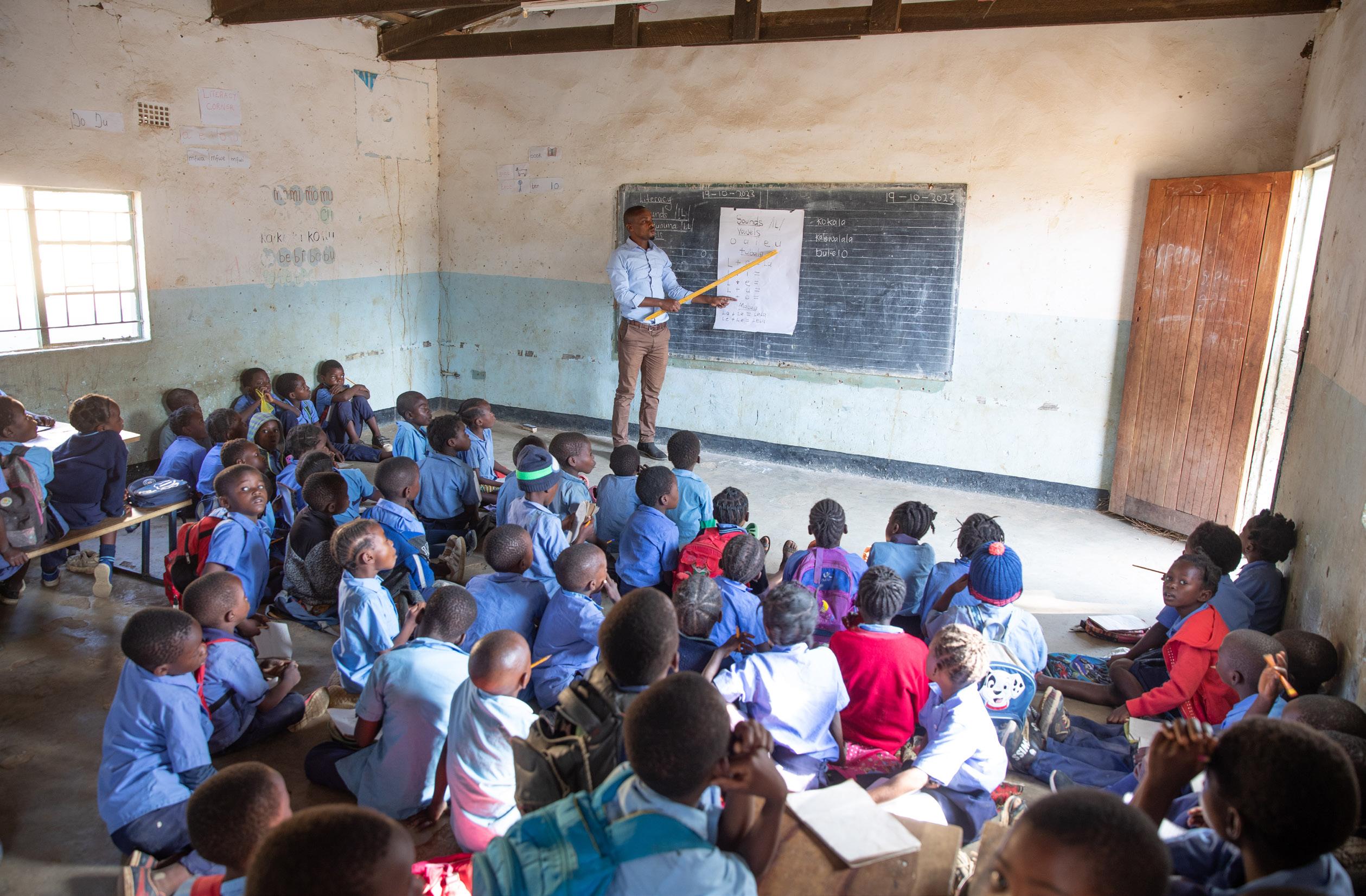
just be married.’ I thought that the only key which can make my life better is education. So I came back to school because it’s free education— no more looking for money to pay for school fees.” So with the help of her own mother caring for her three-month old baby, Maureen made the decision to return to school.
“I’m frustrated because my children cannot get the education [that] they deserve because there are so many [students]. The more kids are in the classroom, the less attention they get.”
Before she became pregnant, Maureen had to endure these horrendous conditions at Sala during her younger grades. Today, her daily experience is better, as the 100 desks available at the school are mostly saved for the older kids. But for a thousand younger students, sitting on cold, hard concrete, squished between dozens of classmates, is where their educational journey is lived.
It’s a frustrating thing for parents to watch. Alberto Mweenzyabanyama is an alumnus of the school; he started there as
a boy in 1983. Although he loves Sala for how it positively affected his life, he wishes his own children had a better learning environment. “I’m frustrated because my children cannot get the education [that] they deserve because there are so many [students],” says Alberto. “The more kids are in the classroom, the less attention they get, you know?”
In 2023, the situation at Sala reached a critical impasse where the status quo was no longer sustainable. Something had to give. The Adventist Church in Zambia reached out to Maranatha for assistance. Maranatha agreed to construct a new four-classroom building at Sala. This will be a huge relief for the administration, staff, and students alike. Children will be able to spread out into different spaces, lowering the number of kids in each classroom, and relieving the load on teachers. There’ll be more room for learning for students and teaching for educators. And Maranatha is providing desks, a luxury most of these kids have never experienced.
But although the new classrooms will allow for more space, it creates another problem: who will teach in those classrooms? Currently there are fourteen instructors at Sala teaching various
16 | THE VOLUNTEER ISSUE 1, 2024 www.maranatha.org
1
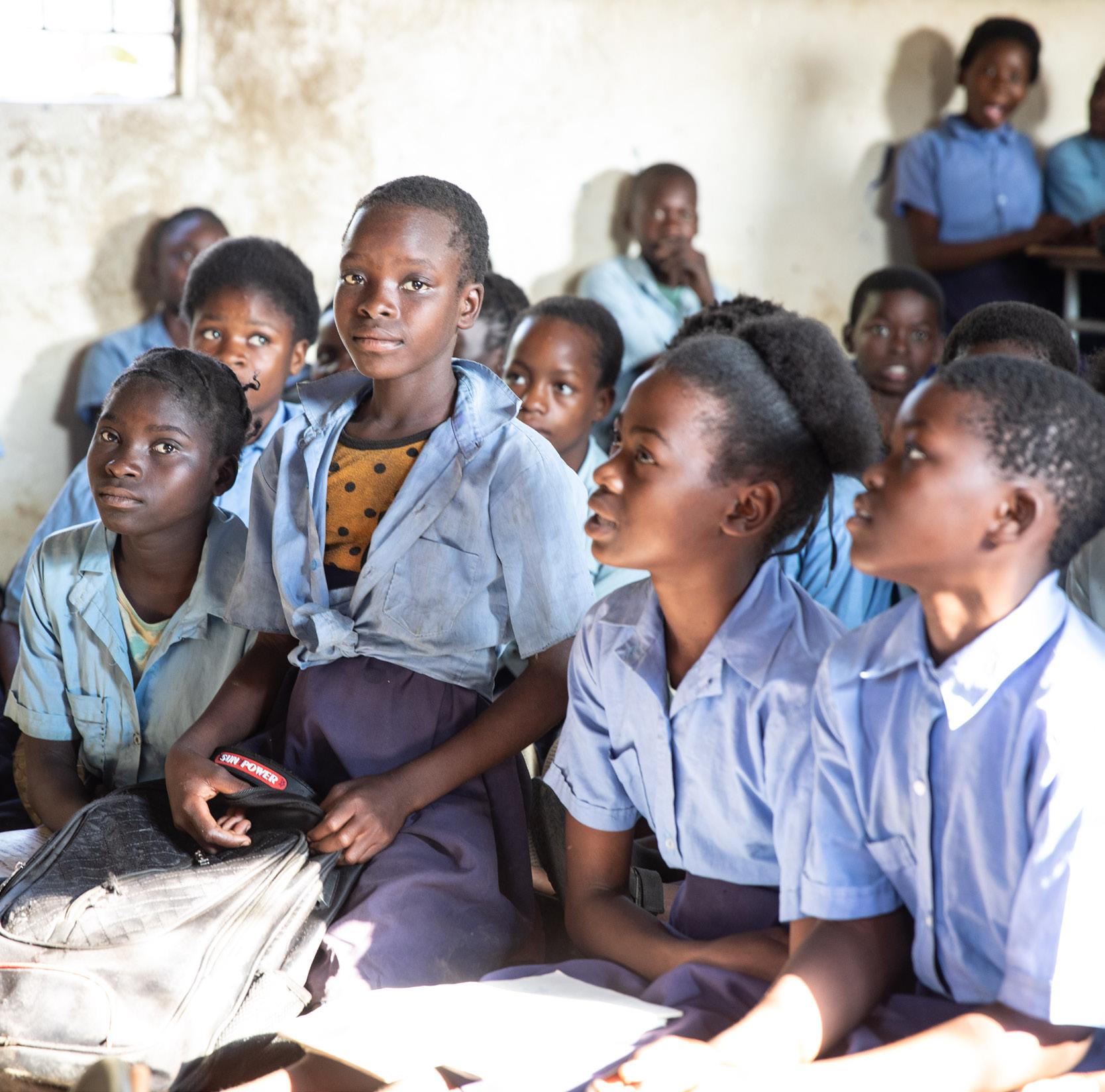
grades and subjects in 12 classrooms. With four new classrooms, there will be more space, but who will take charge of these rooms? More teachers are needed. The government agreed to provide more faculty, but only if staff housing is provided on-site. After consideration, Maranatha is stepping up to build a six-unit staff housing block, thanks to the gift of a generous donor. These on-campus units will give teachers adequate space for living while saving them from a long commute each day. More teachers and more classrooms—Sala will finally have space to breathe.
“I can’t wait for that day to see [the students] rejoice, dancing, praising you, the Maranatha team, to come to their aid,” says Alberto. “They’ll be happy.” Construction is set to begin at Sala in 2024, and it can’t come a moment too soon. Each new classroom will not only result in greater comfort, but also in bright futures for these students whose learning experience has been handicapped by a lack of space. More room will equate to elevated concentration, increased comprehension, and greater achievement, ultimately equipping young people to pursue
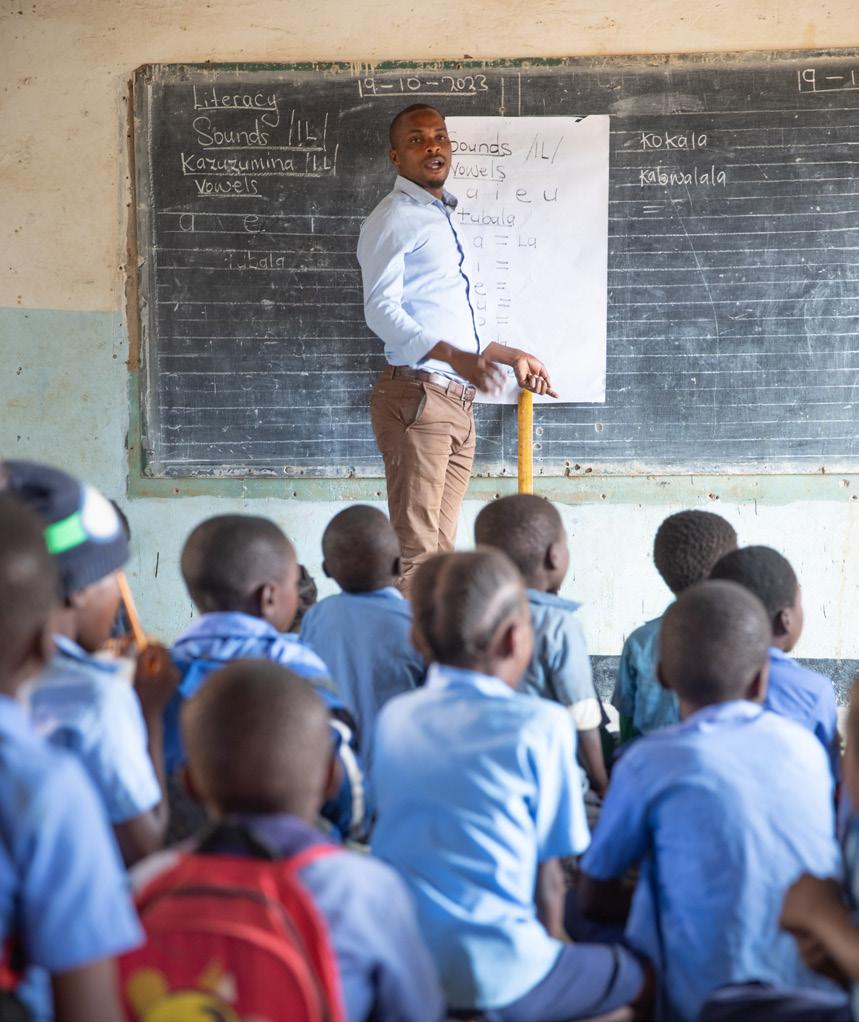
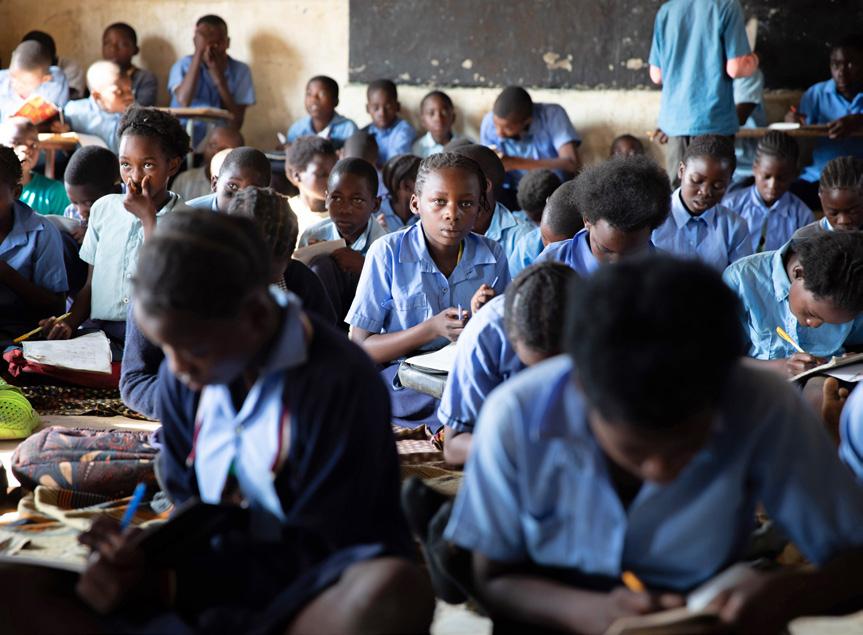
higher education and professional careers.
“We come here because we know that education is the key to success,” says Maureen. “So we are doing our best so that we can live better. Because here where we are, a lot of people are unemployed. We see that when we come to school, we get educated, we live a better life. We [will] start working as teachers, doctors, things like that.”
“As the Bible says, train up a child in the way he or she should grow. So if Maranatha will come to our aid to help us build more classroom blocks for these learners…we’re going to have a learner who is going to be a very good future leader for Zambia,” says math teacher Rodgers Malambo. “Not only for Zambia, but for the world.”
The Sala School project is still in need of funding! Will you help to provide these children with more space for learning? Make a gift of any amount to the Sala project and 100% will go toward the construction of these new classrooms. Use the attached envelope or visit maranatha.org/givingtuesday to make a gift.
MORE SPACE FOR SALA:
1 Giving individual attention to each student at Sala is impossible.
2 The cold, hard concrete floors are where most of these students’ education is received each day.
3 With new classrooms, students and teachers alike will have more room to breathe.
4 With more classroom space, academic achievement is sure to increase with an improved learning environment.
www.maranatha.org THE VOLUNTEER ISSUE 1, 2024 | 17
3 2 4
SACRED SERVICE IN THE SACRED VALLEY
Families serve over Christmas in Peru
By Julie Z. Lee
This past December, 43 volunteers jumped into service in Pisac, Peru, for the Christmas holiday to serve on Maranatha’s Family Project. From December 22, 2023, to January 1, 2024, volunteers built a new church for the Matinga Seventh-day Adventist congregation. The team also organized community service activities, such as Vacation Bible School, food distribution, and medical, dental, and vision clinics. Additionally, the group raised $25,000 to buy chairs, tables, a projector, sound system, and bathroom for the Matinga Church.
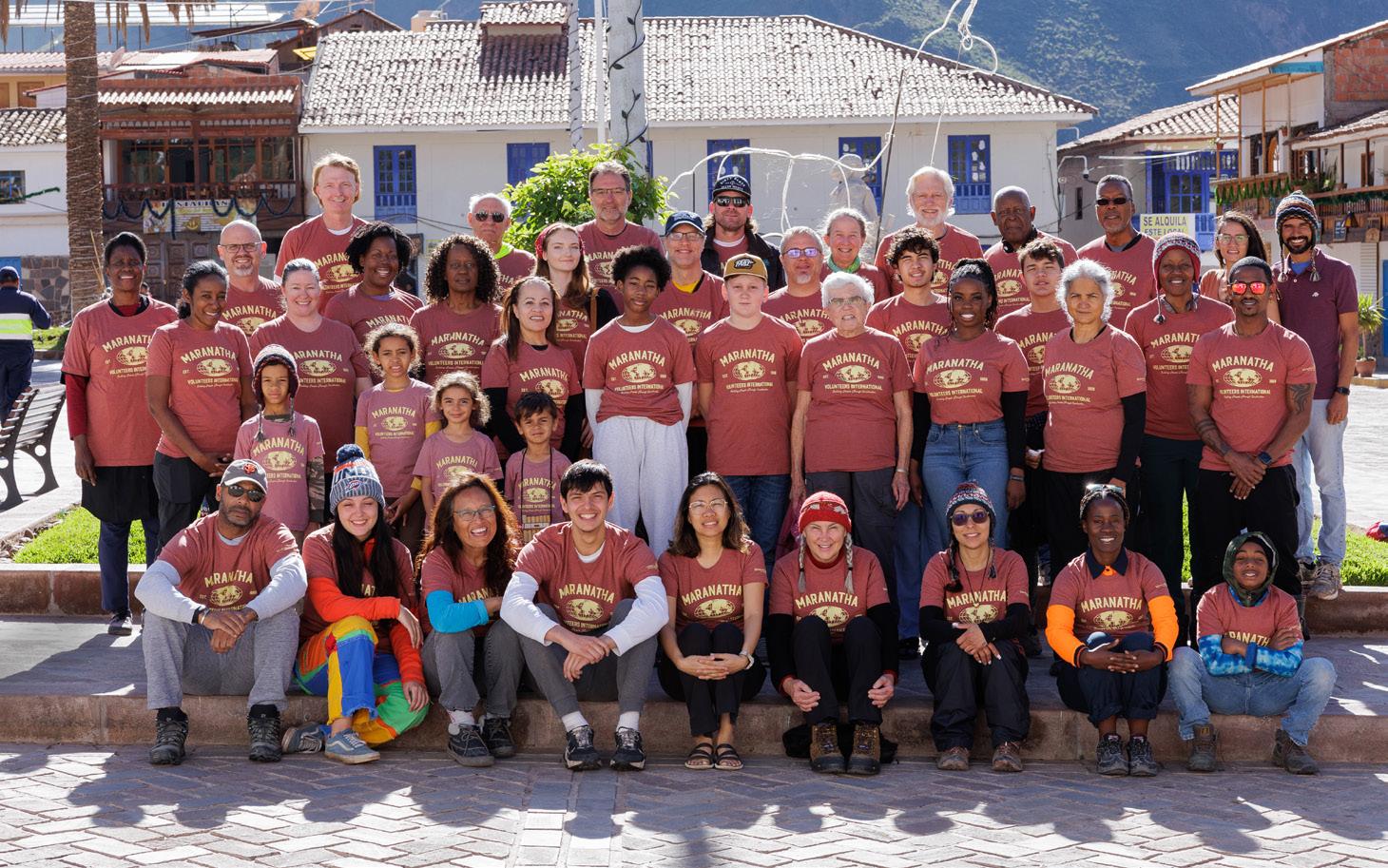
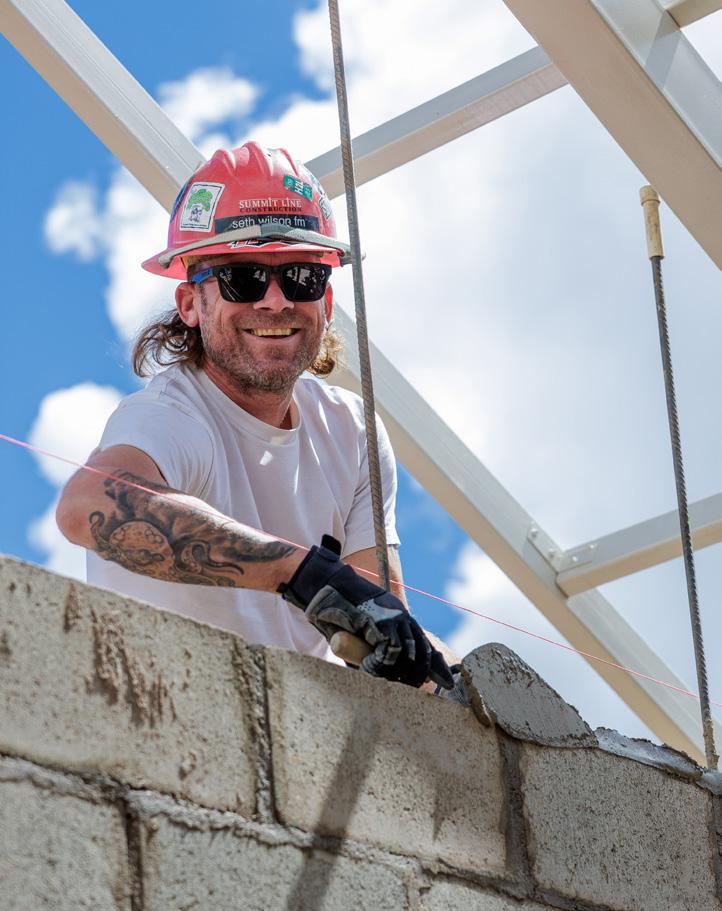
EXPERIENCED:
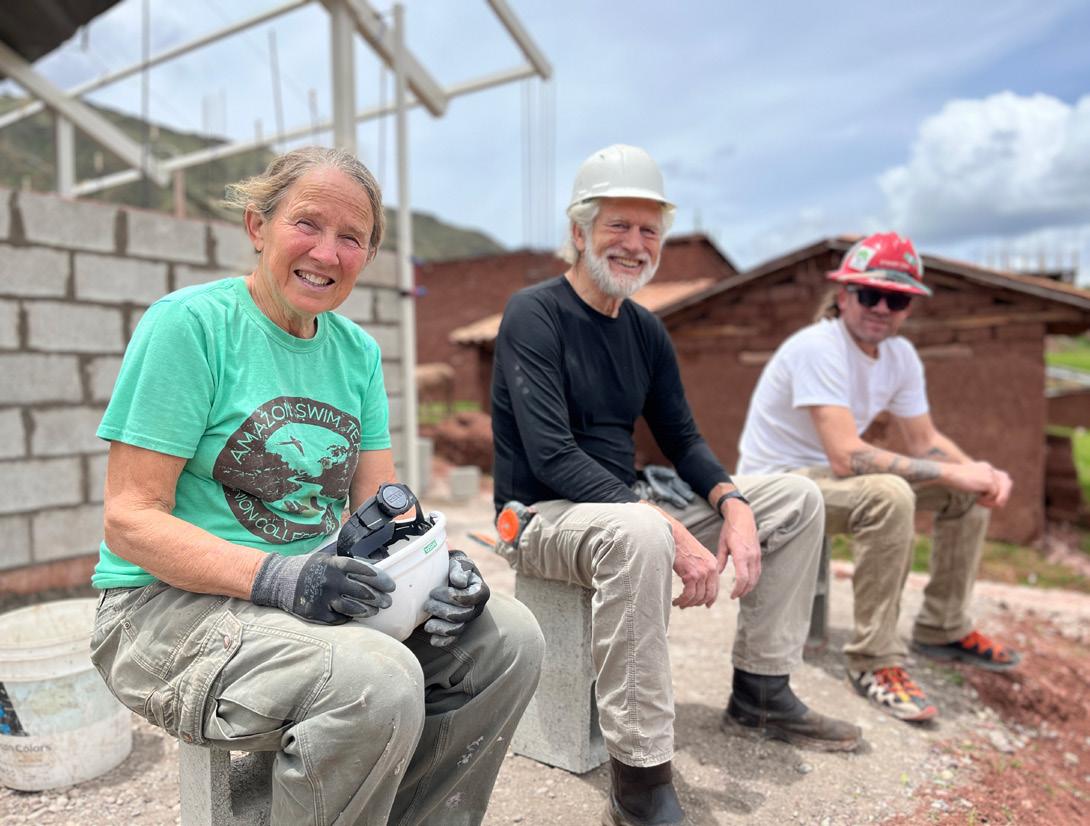
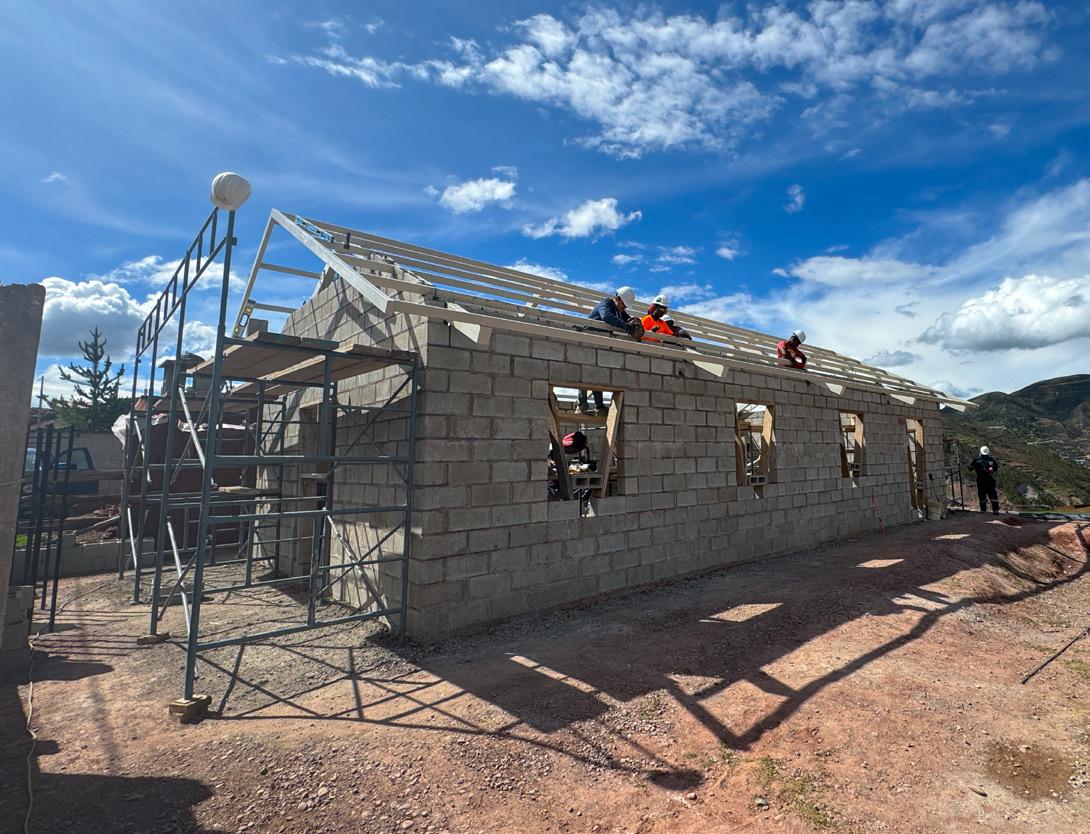
RAPID CONSTRUCTION:
18 | THE VOLUNTEER ISSUE 1, 2024 www.maranatha.org
The walls of the new Matinga church are nearly complete, after less than a week of construction by the volunteers.
TEAM:
Forty-three volunteers from 13 states in the United States, along with some from Australia and Peru, pose for a family photo.
Seth Wilson, from Idaho, nears the top of his wall as he works diligently at laying block. This was his eighth mission trip.
FAMILY CREW:
(Left to right) Kathi, Doc, and Seth Wilson, a mother-father-son team, take a short break from construction. This trio have served on multiple Maranatha projects together.
PHOTOS TOP ROW: TOM LLOYD | PHOTOS BOTTOM ROW (L-R): JAVIER REYES, TOM LLOYD
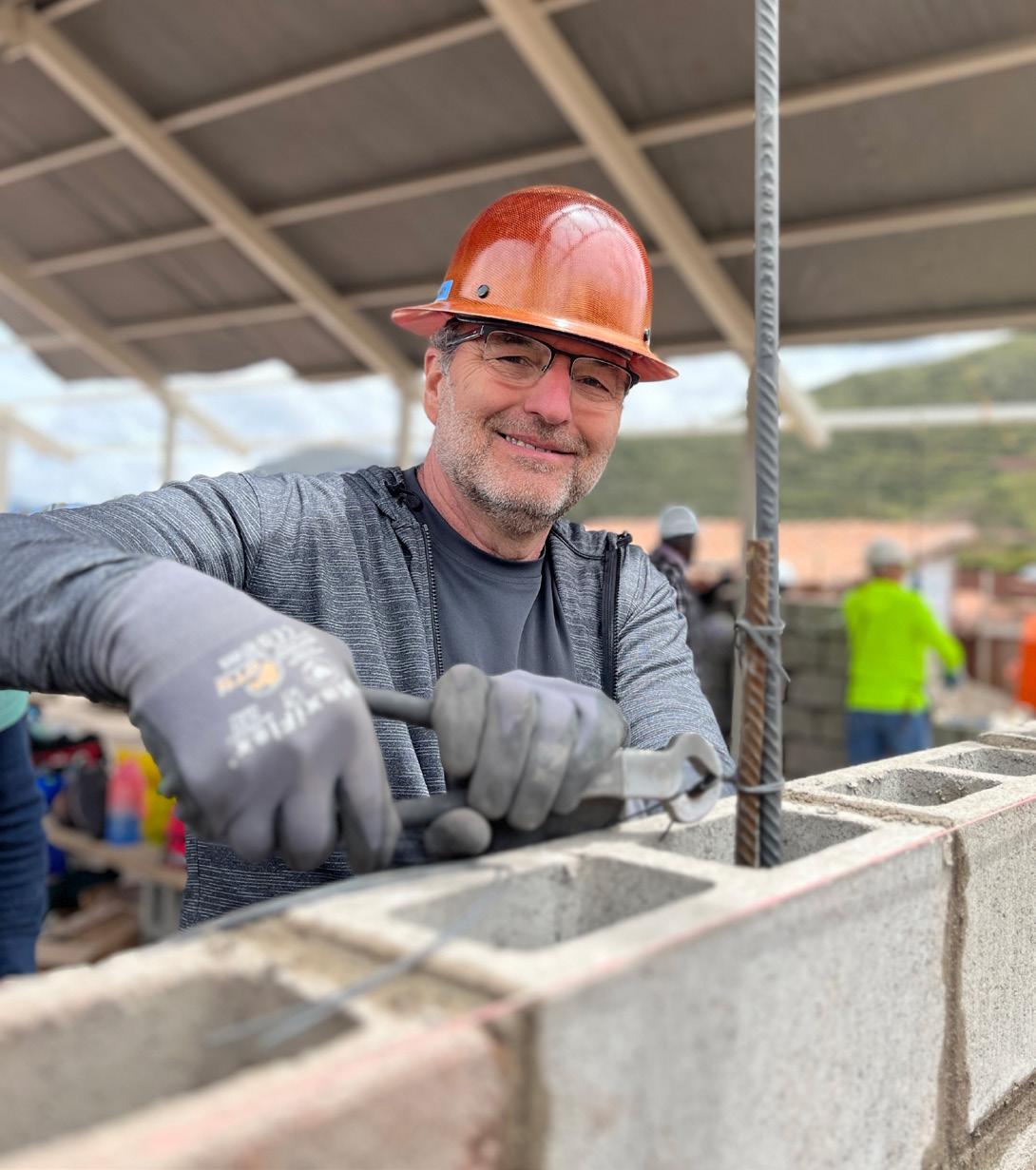
SITE LEADER:
Danny Poljak, construction superintendent on the project, works on the wall of the church. He has attended and led Family Projects with Maranatha since 2012.
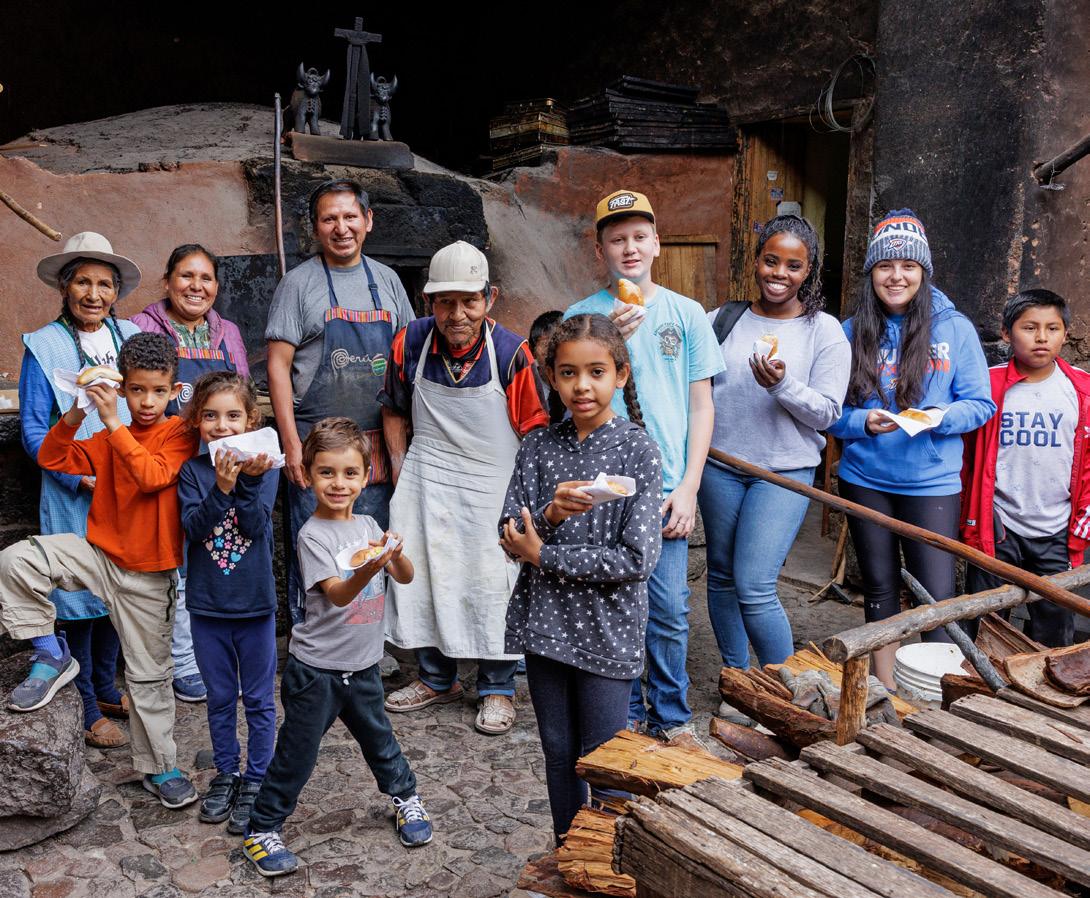
DAY CAMP:
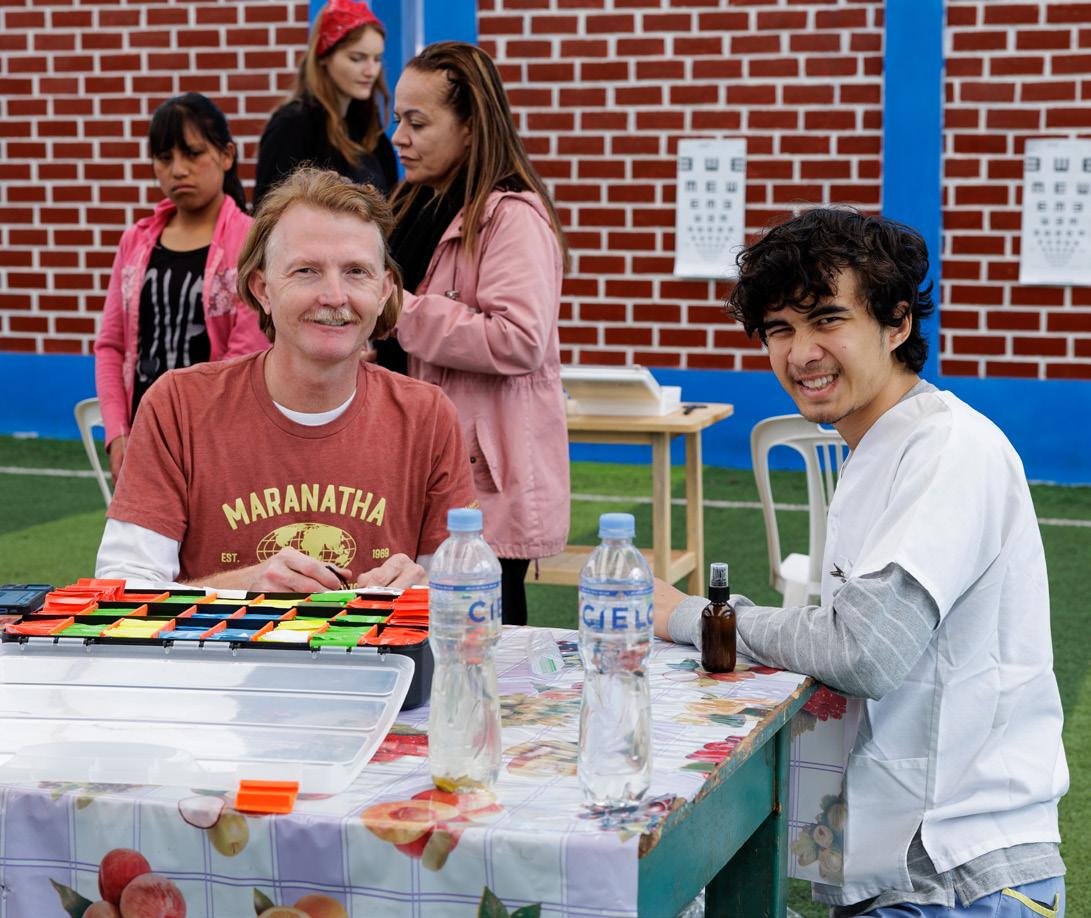
SEEING CLEARLY:
Volunteers Flagg Youngblood and Donald Keen Lloyd work at the vision clinic, where they fitted people with prescription glasses.
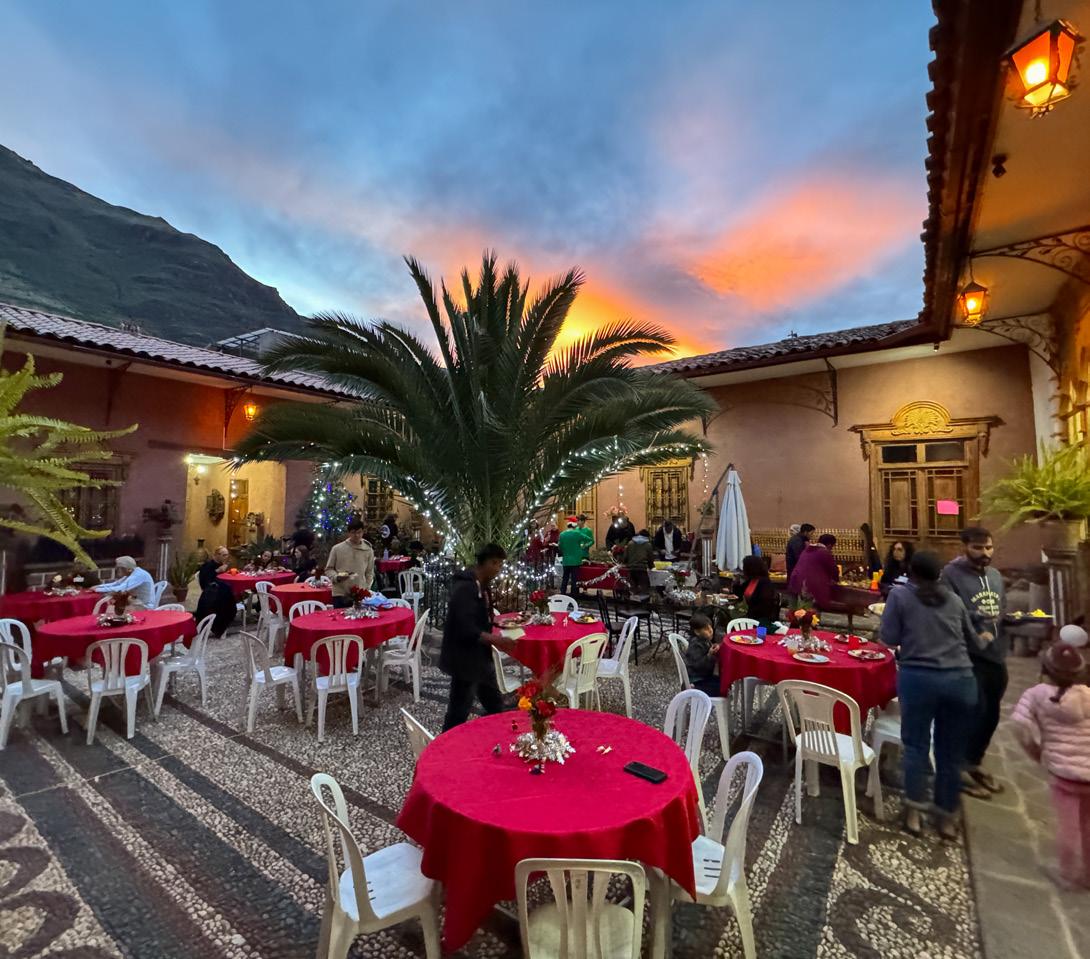
CHRISTMAS SUPPER:
Volunteers gather for a special holiday dinner to celebrate Christmas with family and new friends.
ALL SMILES:
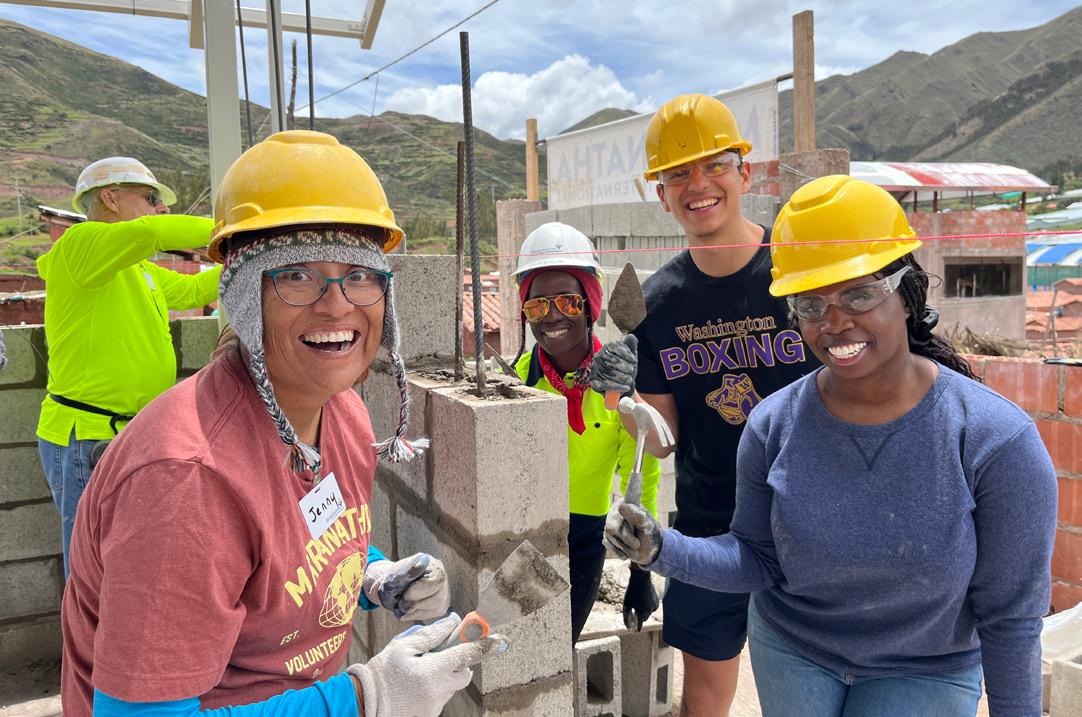
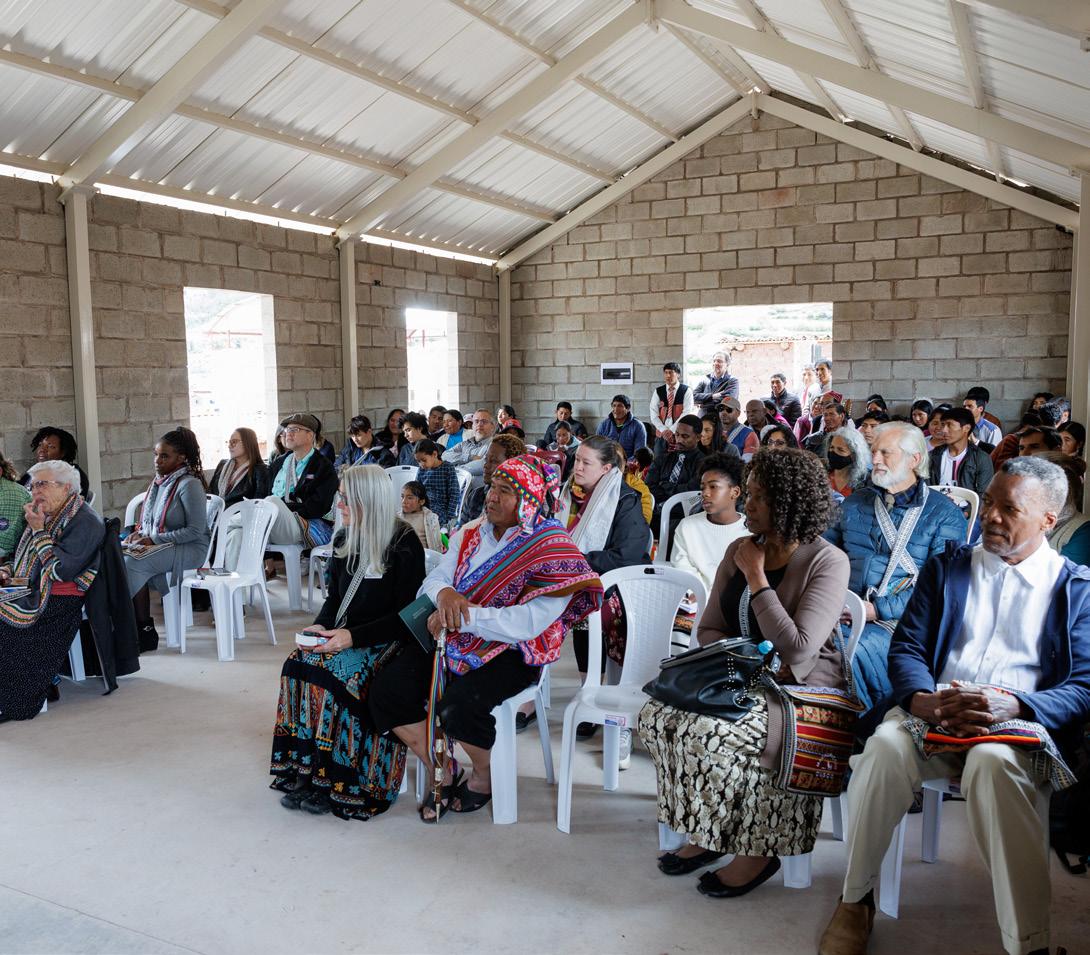
SABBATH DAY
On the last Sabbath of the project, church members, volunteers, and visitors gather together in the community’s newest place of worship.
www.maranatha.org THE VOLUNTEER ISSUE 1, 2024 | 19
Volunteer Jenny Vickrey (left) is hard at work with her fellow volunteers at the Matinga Church worksite.
The team’s youngest volunteers show off their empanadas. Their edible creations were part of Day Camp, a special program for kids on all of Maranatha’s Family Projects.
PHOTOS TOP ROW (L-R): JAVIER REYES, TOM LLOYD
|
PHOTOS MIDDLE ROW: TOM LLOYD
|
PHOTOS BOTTOM ROW (L-R): JAVIER REYES, TOM LLOYD
HOW YOU’VE Helped
KAKOLE , ZAMBIA
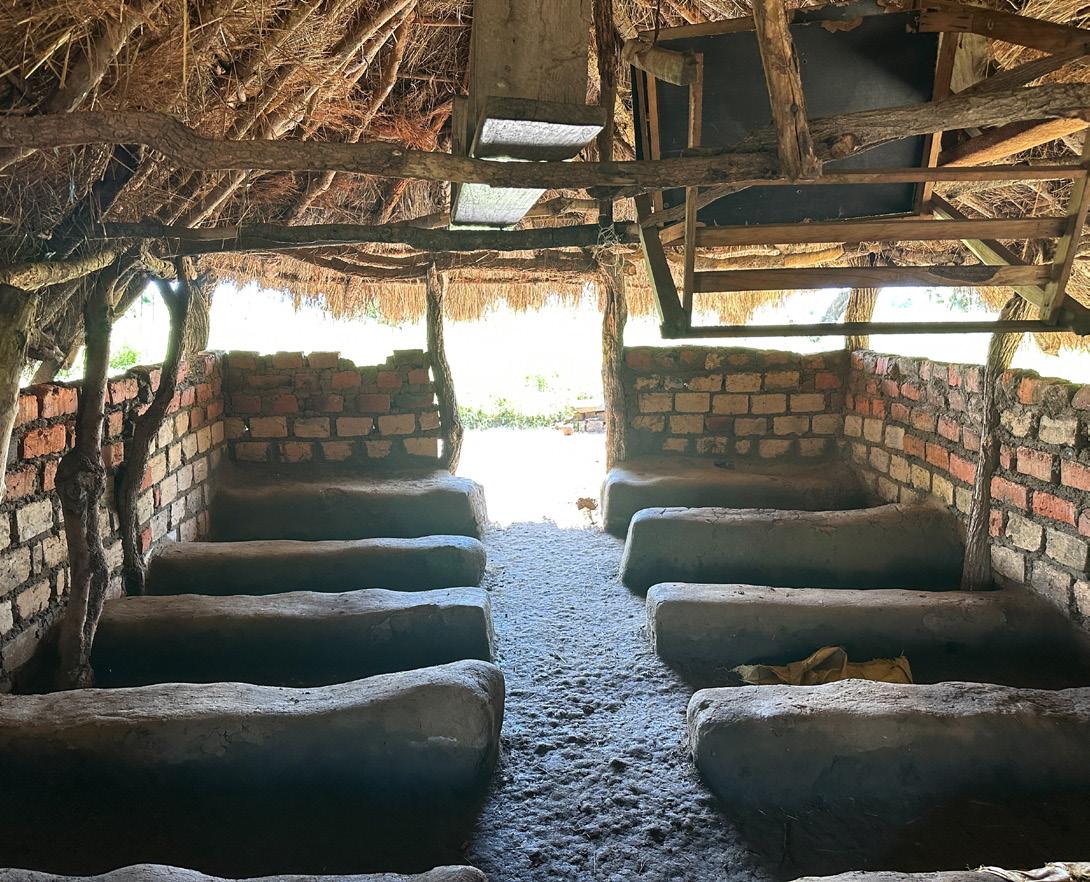
A look at how your support is making a real difference for communities around the world.
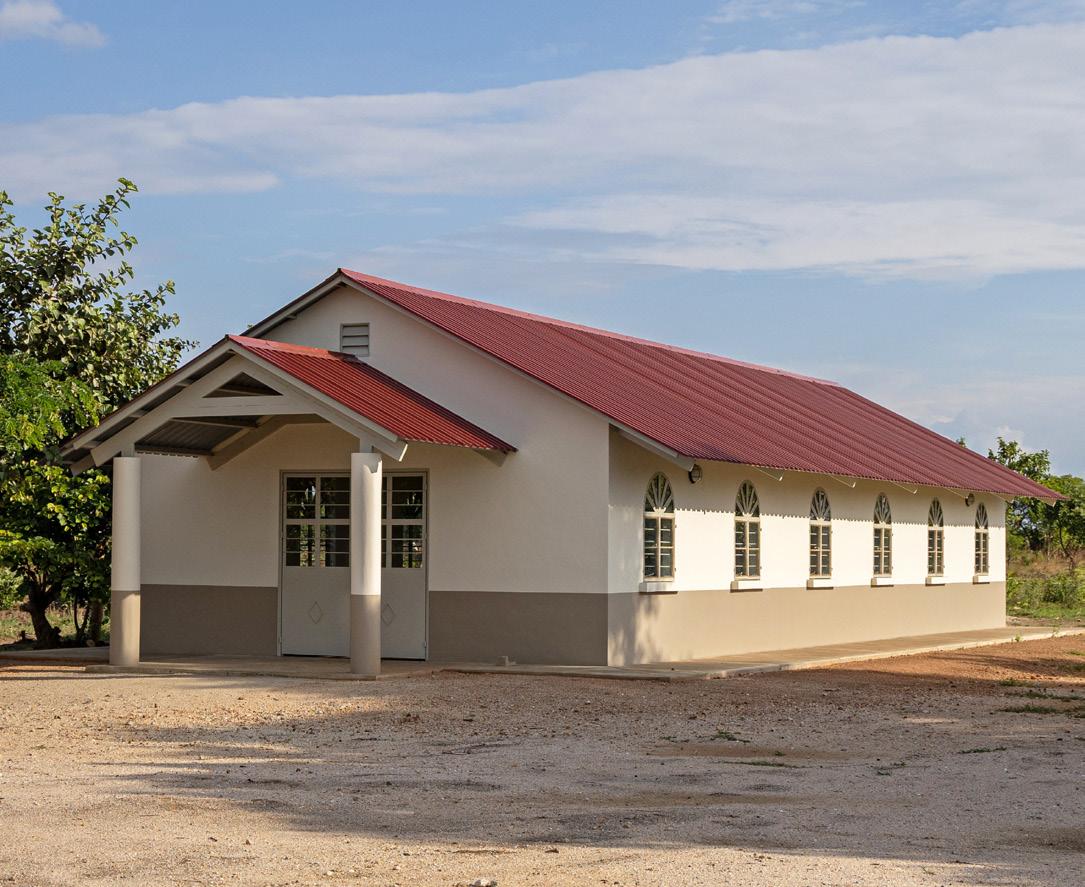
LEAVING
YOUR Legacy
When Joshua Seventh-day Adventist Church members Irene Dennison Herr and Mavis Armstrong discovered they hadn’t counted up their Loma Linda brand food labels in quite some time, they quickly realized they were sitting on around $300. For years, Loma Linda has maintained a label redemption initiative called “Labels Make Cents” that supports Adventist organizations when redeemed. The ladies discovered they had 1,200 food labels and
decided to use the proceeds to fund clean water through Maranatha. Not only did they make good use of those labels, but they recruited their 20-member, Texas-based congregation to get involved as well. Members collected loose change, sold furniture and collectible coins, and donated money saved from discounted shopping purchases. In all, the group donated $1,700, raised from March through November 2023!

20 | THE VOLUNTEER ISSUE 1, 2024 www.maranatha.org
BEFORE Worshipers squeezed into this small, rudimentary hut every Sabbath.
AFTER They now enjoy meeting in the beautiful new church building Maranatha constructed for them.
PROJECTS THAT NEED YOUR HELP
These are the projects in most urgent need of funding right now. Please consider making a donation!
In 2024, Maranatha’s most urgent need is for churches and water wells. Please make a donation in any amount toward church or water projects. You can also sponsor an entire One-Day Church, church, or water well in honor or memory of a loved one. Give at maranatha.org or call (916) 774-7700.
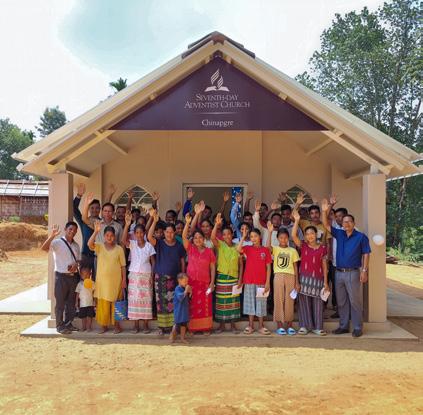
CHURCHES
Maranatha provides two types of churches: fully completed structures and One-Day Churches. Fully completed structures include a steel frame and roof, walls, floors, windows, stucco, and paint. One-Day Churches, typically provided in more remote areas where traditional construction resources are unavailable, consist of a steel frame and roof. Congregations then complete the walls with local materials. Full sponsorship of a One-Day Church starts at $7,500; shares are $1,500. Please call for sponsorship of a complete church.

WATER WELLS
Maranatha is drilling water wells in six out of the ten countries where we are building. We also have a well maintenance program in certain countries, where we have previously drilled a well. Teams travel from site to site, responding to calls for repairs or conducting maintenance. Sponsorship for a full well starts at $10,000, depending on location. To support Maranatha’s water program in general, from new wells to maintenance and repairs, you can join Wellspring, a monthly giving program. Simply donate an amount of your choice each month, and it will go toward providing clean water to a community in need.

Countries IN 2024
Here’s where Maranatha is working this year.
BRAZIL
CANADA
CUBA
DOMINICAN REPUBLIC
INDIA
KENYA
PARAGUAY
PERU
UNITED STATES
ZAMBIA
www.maranatha.org THE VOLUNTEER ISSUE 1, 2024 | 21
CAMPS
CHURCHES SCHOOLS WATER WELLS
2024 PROJECT SCOPE 300 Churches 255 Wells Well Maintenance Projects 10-15 Other Projects Scan to give
PROJECT Calendar
Anyone can join a Maranatha mission trip! Check out our upcoming opportunities here or go to maranatha.org for the most updated list.
Apr. 23-May 8, 2024 Uchee Pines Institute Project ALABAMA, USA Ernie and Jeanice Riles New build
Apr. 28-May 8, 2024 Camp Lawroweld Project MAINE, USA Glenda and Lee Davidson Camp renovations
May 12-Jun. 2, 2024 Andrews University Project MICHIGAN, USA Jon Harvey, Ron and Nancy Davis Renovations
May 20-31, 2024 Camp Frenda Project ONTARIO, CANADA Glenda and Lee Davidson Camp renovations
May 22-Jun. 7, 2024 Project Patch Project IDAHO, USA
Jun. 9-21, 2024 Milo Academy Project OREGON, USA
Jon Yarlott, Doug and Melody Wheeler Campus renovations
Darrell Michael, Ed Jensen Renovations
Jun. 9-23, 2024 Pine Tree Academy Project MAINE, USA TBD Renovations
Jun. 10-21, 2024 Pine Hills Academy Project CALIFORNIA, USA Tom Pooler School renovations
Jun. 19-Jul. 10, 2024
Cleveland Fellowship Church Project TENNESSEE, USA Betty Beattie Chrispell, Dave Wilbur New construction
Jun. 21-30, 2024 Catalyst Project(Collegiate & Young Adult trip) DOMINICAN REPUBLIC Jessica and Joey Osborne New construction
Jun. 27-Jul. 9, 2024 Zambia Project ZAMBIA
Karen Godfrey, Peter Thomas, Kenneth Weiss School construction
Jul. 9-23, 2024 Walla Walla University Project WASHINGTON, USA Charley Chavez, Gail Lutton Renovations
Jul. 11-22, 2024 Ultimate Workout SICUANI, PERU Lisandro Staut, Loretta Spivey Church construction
Jul. 29-Aug. 14, 2024
International Pathfinder Camporee WYOMING, USA TBD Camp setup and teardown
Aug. 20-Sept. 3, 2024 Kenya Project KENYA
Go to maranatha.org to see all the volunteer opportunities being offered, including full projects and mission trips being coordinated by church or school groups.
Thank You FOR SERVING
DOMINICAN REPUBLIC
Mission IS Possible Team | Texas
Amazing Grace Academy Team | Alaska
Bass Memorial Academy Team | Mississippi
Armona Academy and Visalia Church Team | California
Spencerville SDA Church Team | Maryland
Hinsdale Adventist Academy Team | Illinois
John Thomas, Peter Thomas, Tyler Duffy School construction
The following Group Project Teams served during the months of January through March.
KENYA
Greeneville Adventist Academy Team | Tennessee
Sonora Youth Mission Team | California
PERU
Markham Woods Church Team | Florida
Chehalis Church and Friends Team | Washington
Palisades Christian Academy Team | Washington
Ozark Adventist Academy Team | Arkansas
22 | THE VOLUNTEER ISSUE 1, 2024 www.maranatha.org
DATE PROJECT NAME PLACE LEADERS SCOPE
PISAC, PERU
Eluterio Chura holds up a photo of himself in a 2004 issue of The Volunteer. The story was an introduction to Maranatha’s new effort in Peru, specifically in what is called the Sacred Valley. Eluterio is the founding member of the Pisac Seventh-day Adventist Church. In 2005, the Carmichael Seventh-day Adventist Church, from California, went to Peru to build the congregation a new church. Since then, Pisac has given birth to several daughter groups.
Eluterio, who keeps a copy of this magazine on the dashboard of his truck, shared the photo when he met up with Maranatha volunteers in December 2023. Forty-three volunteers, with the annual Family Project, were in the Sacred Valley region to build a new church for the Matinga congregation. He spoke to the volunteers and the Matinga members to tell his story, express his gratitude for Maranatha’s work, and encourage the congregation to use their new church for good.
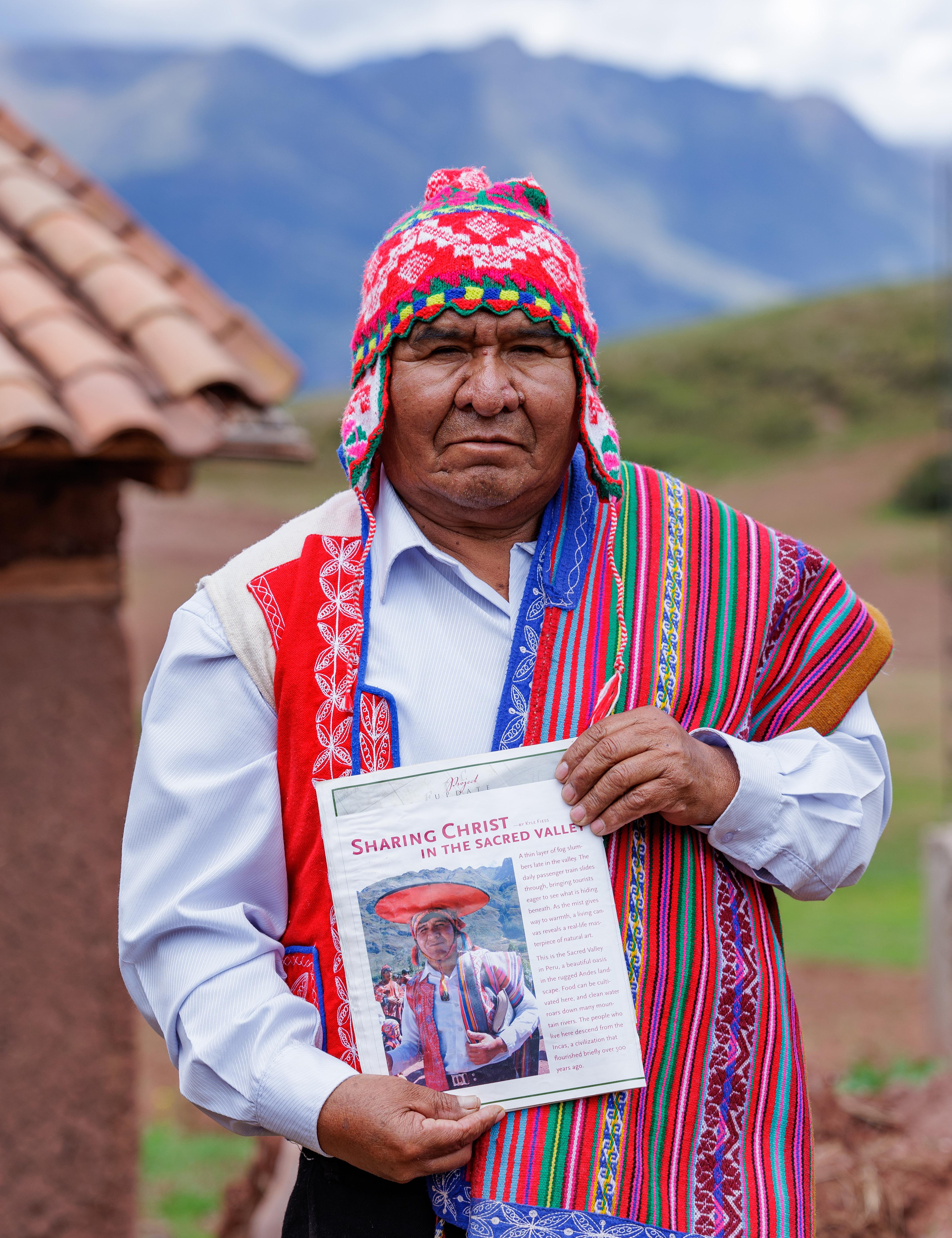 Photo by Tom Lloyd
Photo by Tom Lloyd
990
Roseville, CA 95678
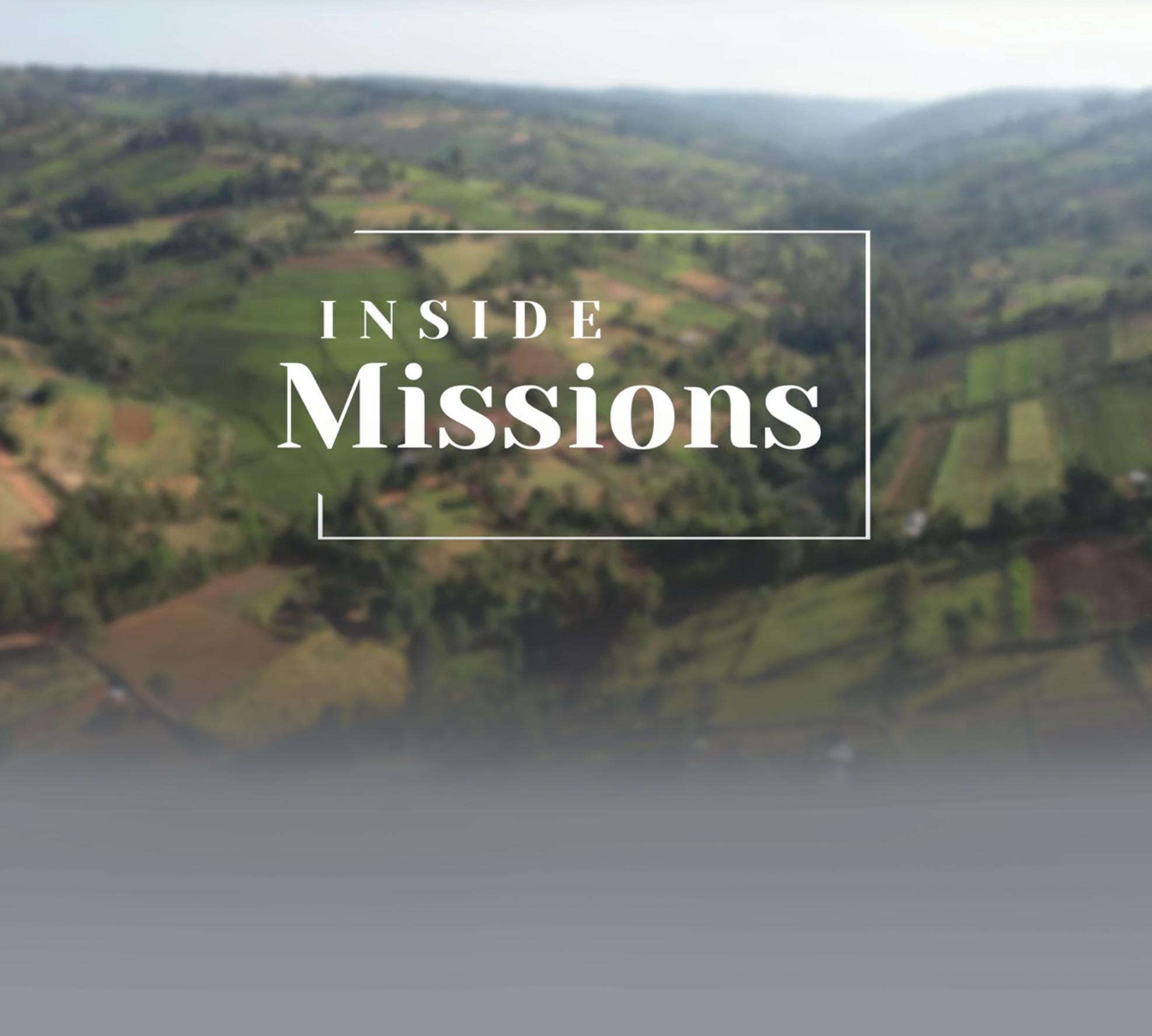
New Podcast!
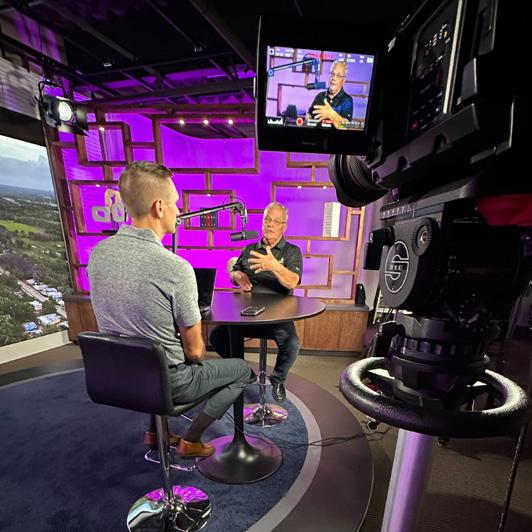
Meet the many people of Maranatha in our new podcast, “Inside Missions.” Each episode tells the story of a Maranatha person about their life, their journey to Maranatha, and how missions has impacted their lives.
Watch on YouTube, or listen on Apple Podcasts. Google Podcasts, Spotify, Amazon Music, and anywhere else you find your podcasts.
Travel into the mission field and see how God is leading ordinary people to make an extraordinary difference in communities around the world with our television program, Maranatha Mission Stories.
HOW TO WATCH
BROADCAST CHANNELS
(All times PT)
3ABN
Friday, 7:30 p.m.
Saturday, 2:00 p.m.
Hope Channel
Sunday, 6:00 p.m.
Wednesday, 3:30 p.m.
ON DEMAND
The Maranatha Channel App
Watch current and archived episodes and other videos on demand. Download for Apple, Android, Amazon Fire TV, and Roku.
watch.maranatha.org
View all episodes online at Maranatha’s video website. Find segments by using our “Search” function.
Reserve Drive, Suite 100
Non-Profit U.S. Postage PAID Rancho Cordova, CA Permit No. 361
















 Photo by Leo Macias
Photo by Leo Macias
































 Photo by Tom Lloyd
Photo by Tom Lloyd

